#its conflict its plot its FINE
Explore tagged Tumblr posts
Text
so hey guys i finished dungeon meshi yesterday and i'm still thinking about it
#ria.txt#i spoiled myself so at first i was like 'this is bonkers wtf are they doing in those last few chapters?????'#but then it was like. yeah. i see#love those ch when it's just clearly putting the squad into Situations#also. izutsumi#what i really liked was how tightly the protagonist and the deuteragonist were wound up in the overall themes#the plot the themes the conflict the characters it was very neatly connected#hence i am also now accidentally invested in whatever going on between laios and marcille#not just platonic not romantic not enemies i just think they work well tgt and deeply care for each other its great watching them develop#it's the leader + most trusted advisor / anxious girlfailure + the annoying freak she's somehow attached to vibes#haha that rabbit chapter with marcille. hahha i was like what the fuck man. it was funny and then boom whump [tears streaming down my face]#those shapeshifter chs were sooo much fun esp seeing other chara's perceptions of each other. stealing that#the changeling ones were great too elf senshi is the fucking funniest he looks sooooooo unserious#marcille's evolving perception with death starting with saving falin and saving the squad and her nightmares of outliving everyone-#-and her dad and her 'temper tantrum' and UGH when at the end she said she was fine with falin not coming back.... WAAA. OUGH.#i think dunmeshi handled the trope of 'prophecy of chosen one becoming king' pretty well and it makes sense why laios is the protag#the worldbuilding is so thoughtful as well i liked seeing different characters with different worldviews interact#very solid and well rounded series wooo#the main 4 has such a fun dynamic together#anyways. dunmeshi au.....#more like borrowing the worldbuilding bc charas are too nuanced for a one to one comparison#ren is like some prince of his own species but he's like 34th in line and no one cares about him so he fucks off to eat monsters#which is why he's both snobbish AND a total freak when it comes to his food taste#false is originally in for the money from ren and plans to scam him but unfortunately the cringefail swag captures her#martyn is Obnoxiously Clueless and thinks he's smart but he's not. he's resourceful but also pathetic and crazy#stress cant cook but she thinks she does so everyone goes (≖_≖ ) when she picks up a pot. they delegate her to killing and chopping duty#the mvp is iskall who keeps on saving everyone's asses and somehow has resources for everyone#i think ren is actually aware false is going to scam him but he has too much money to spend anyway and he thinks shes cool so he lets her??#and somehow she doesnt take the money and run. and goes back to eating monsters w/ the party. everyone is crazy
67 notes
·
View notes
Text
Me and friend watched Rise of Red and have uh, two reviews: *It was a movie. *Descendants 3 actually looks more appealing as a movie then this...movie.
#we watched it as soon as we got back to his place#just to get it over with#and god it was bad lmao#like not even a bad you might find it funny#just bad#the plot was all over the place#theres zero room to breath for the characters unlike D1-3#some of the fashion is bad#alot of the song lyrics are bad or just the frozen issue off conversations in song format#and the whole conflict is so stupid its basically 'your all fucking idiots'#also i am not huge on red#chloe is fine to me a ltitle but the film really does not seem to like her or princesses#and the time travel...dont get me started#just dont#let alone how themes like parental abuse are handled#and the fucking beginning DONT TEST ME-
8 notes
·
View notes
Note
Anon who started the its kinda creepy everyone smiling.
I'm not saying you can't have all smiles i said i know your fixing some of the problems, there isn't any conflict is what im saying i know if i have thoughts i should keep them to myself but this isn't me downing you or your AU i was just making note that things were too happy to be in a ninja world where killing is a thing and you made some of my favorite characters live yes but there is not enough problems or conflict, i love happy aus but somethings gotta happen ya know what im saying? if not just ignore me i was just speaking wasn't trying to put you down or out.
No, it's okay. Look, I skip fights. Most of them I try to go around them to make my job easier when drawing. We've seen the fights already, all I need is for people to understand the fights happen.
Kiba still fought Sakon but I didn't draw any that, I can't redraw everything, even the fights I do draw sometimes I wish I could make them longer, but I physically can't lol
That out of the way, let me honestly ask what about Kabuto and the Sound village? The edo tenseis? Gaara being targeted? These are some conflicts I have ongoing rn. What about Sasuke's trouble after losing Shisui? And Naruto feeling like he doesn't fit? The animal clans discrimination that keep Shikamaru of all people traveling all the time? The Sand village terrorists? Danzou is also still out there.
I do love keeping the constant happy faces, that is my favorite part and that is what I wanted to see... family 7, kids with better support and communucation skills, good guy Orochimaru earlier on, most people live AU... But I gotta say it does sting to hear 'no problems or conflict', because I'm not gonna make it perfect and manage the same 'ninja world' stake levels, but as happy and cute as it is I do put effort in making the AU make sense as a whole.
#its totally fine to share your thoughts and criticism actually#but im also gonna defend myself so dont take it personally#i dont mind that youre asking for more plot#the moment of the story we re at is VERY plot light though#but to say theres no conflict... eeh hits different#thanks for being chill about it at least#ask ffrogs
23 notes
·
View notes
Text
Ok so from what I'm seeing the Knuckles series is basically what people act like Sonic Movie 1 and 2 are like with the human scenes
#Personal#Like I see people act like the wedding plot in Movie 2 is some OVERBEARING THING TAKING ATTENTION AWAY FROM SONIC#When its not?#I kept saying that if this was like any other live action/animation movie#90% of the focus wouldve been on the wedding scenes#And it wouldve pushed the Sonic characters completely aside to focus on it#When it didnt. It was fine. It was minor. In the end it even integrated with the main plot aka the Sonic stuff#So now here ya go. Something where Knuckles barely gets to be a thing and we focus entirely on the humans and their own conflicts#So you can all look at it and compare and then apologize to the funny wedding moments in movie 2 that dont even take up any space#or fight Sonic and co for the spotlight
0 notes
Text
I would've loved young justice so much more without the timeskips
#hear me out#i feel like they didnt use any of the time they had to spend it with the characters#like the s1 team is definitely reoccurring#but the conflicts between them start between seasons#and while i adore the s2 crew (esp j.aime) + i love the possession trope... i still wouldve liked to see the characters grow more#individually and stuff. which i guess just is not how the show goes#its got the subplots that go with it but the main plot is the big bad supervillain#which is still fine. but i guess my real problem is i really love these characters and wanted more focus on them#idk. i explained it better when i was talking to myself lol#but thats my thoughts#i didnt finish it for this reason so#misty muses
1 note
·
View note
Text
i'm outside, let's talk. (m)
you finally give in and talk to your ex after numerous attempts of him trying to contact you. surely, nothing will go beyond mere communication, right?



. pairing: exbf!jungkook x afab!reader . wc: 1.3k . genre: porn with very little plot, exes to lovers . cw: just two exes that don't know how to be exes lmfao, car sex, penetration, unprotected sex (don't be like them), doggy, dirty talk, dom!jk, sub!reader, creampie, i think that's it lmk if i miss anything!
a/n: heh... long time no see. after two years of hiatus, i thought about posting smth rlly short to ease myself into writing again :) happy reading! feedback is highly appreciated!


jungkook: come down jungkook: im outside jungkook: we need to talk
what more should be there to talk about? scoffing, you dismiss the string of messages your ex sent, proceeding to go back to your previous activity of mindlessly scrolling through tiktok videos.
why should you talk to him? he had a decision — and the decision he ultimately chose was to disrespect your relationship and leave, much like perpendicular lines never to cross again: that’s the only closure you need.
however, jungkook is different.
you think of him as an insect — those annoying ones in particular. once it gets in your abode, it’ll suddenly forget its way out and invade your precious space as if living with you free of charge.
that’s what your ex is.
stubborn, incessant, and most notably, stupid.
so, it’s not much of a surprise when you see his name appear on the banner on top of your phone again, one text being sent after the other.
jungkook: don’t leave me on read jungkook: i’ll climb up ur window if i have to, ___ jungkook: please baby i wanna talk with u jungkook: istg if u block me jungkook: pls dont
you were about to block him actually, if it weren’t for the video that redirected your attention.
“no caption, no hashtag, you were meant to see this! you’re going to get back with your hot ex tonight and i mean it. he’s thinking about you right now and is thinking of ways on how to make up for his mistakes. go get him, girl! get your fine shyt back!”
you swore your eye twitches after watching an absolute stranger predict the next moments of your evening.
with your ex’s unceasing messages and a random video that is severely relevant to your current situation, is the universe really giving you all the telltale signs you need?
as olivia rodrigo said, you probably shouldn't, but seeing him tonight isn’t a bad idea, right?
after deliberately having an internal conflict, you finally made up your mind after careful consideration.
you’re just going to talk. what harm could there be in that?
so, you heave a deep breath before standing up from your bed, your legs bringing you outside the premises of your home to see his black mercedes parked right in front of your lawn.
you stride over to it in quick steps with the intention of holding a brief conversation with him before you bid your final farewells: that’s what you hopefully thought.
assuming he’s inside the vehicle, you tapped on the tinted window a couple of times before you hear his muffled voice, “get in.”
you do as he says, sitting next to him on the passenger seat, and you almost regret it. it was no surprise that it was dim inside, and the air conditioning of his car only made goosebumps prick your skin, and what’s worst of all is the familiar scent of his perfume permeating your senses again.
and that’s when the realization sinks in that you’re actually with your ex boyfriend right now.
you gaze at him silently. thankfully, you couldn’t see his face clearly in the dark, but his features are still there. you part your lips to break the awfully dead silence, yet your voice came out more meek than you’d like.
“you said you wanted to talk..?”
he lowers his gaze to where your hands are placed right on top of your thighs. he knows his presence was suffocating you, so he can’t help the sigh that escapes his lips. “yeah, just wanted to clear some things between us.”
that’s the last thing you remember your ex saying before he has you bent over in the back of his car.
“ngghh… jungkook!” you gasp, a string of drool dribbling from the corner of your lip as you leave a faint handprint of yourself on the fogged window.
“oh, fuck,” he hisses feeling you clench down on his throbbing length. “missed this tight cunt so much,” he groans before landing a harsh spank on your ass, for sure leaving a red mark that will sting for days. “you missed this dick too, baby?” he pants through ragged breaths, and you could sense that damn cocky smirk plastered on his face despite being behind you.
he pulls out another cry from you when you feel his dick kissing your cervix. “y-yes..!” you sob, face buried in the leather seats.
a chuckle full of menace was heard from him as you feel his slender fingers wrap around the roots of your hair, forcefully tugging you until you’re eye-level with the window.
he rips sob after sob out of you, undoubtedly aroused from how your gummy walls were sucking him in so eagerly, a creamy ring of white making a mess out of his length.
“bet you couldn’t find someone who can fuck you like i do, huh?” he huffs against your ear, voice hot and heavy as a tattooed finger presses itself against your clit. “that’s why your slutty little cunt is making such a mess on my cock, right?”
you mewl, resting your head against his shoulder as you nod eagerly. your bottom lip was trapped between your teeth, rendering you speechless from the way he’s perfectly molding the shape of his cock in your pussy right now.
seeing you like this—all hot and vulnerable beneath him, he couldn’t hold in the cocky grin on his face, his ego inflating to a size larger than the earth itself.
he lands a particularly harsh slap against your ass, making you yelp in pain before you fall face flat on the leather seats again.
and when he sets his pace to that of raw, primal need, you begin to tremble, sensing as if your legs are about to give in on you any moment.
“j-jungkook—hah… too much,” you whine, feeling your impending orgasm approaching rapidly.
“cum with me, baby,” he pants, pressing his solid chest against your back, leaving you no room for any escape.
the way the tip of his leaking cock kept kissing your soft spongy spot has you seeing stars. his car became way too humid from how long he’s been fucking you, and you could care less whether the car could be seen rocking back and forth in the middle of the neighborhood, or whether or not the obscene noises you and jungkook were making could be heard a block away.
“please… wanna cum s’bad!” your words come out slurred, brain turning into complete mush devoid of any thoughts aside from cumming.
“awww, my baby wants to cum?” he coos sweetly against your ear, turning absolutely feral seeing you all submissive for him, sobbing as you beg for some sort of mercy from him.
and of course he’s going to give it to you.
he feels your walls hugging him for dear life, as if never wanting him to pull out, and he swears he could die a happy man like this right now.
“go on, baby, let go. i got you,” he whispers hotly before swiping your clit three more times, giving you the most delicious orgasm you haven’t tasted in months.
you tremble violently beneath him, a long whine escaping you as he fucks you through it, soon cumming right after you did.
he groans, flooding your hole with his warm cum before finally pulling out a minute later.
exhausted, he plops himself right next to you, and neither of you have spoken for a few minutes, merely the sound of your mingling breaths could be heard in his dark mercedes.
however, when you look into his eyes, you can see the change of look from lust to determination. you notice him hesitating for a bit, and before you could ask your ex what’s wrong, he swiftly cuts you to the chase.
“give me one more chance, baby.”
#bangtan#bts#bts jungkook#bts smut#bts x y/n#jungkook smut#bts x you#bts x reader#bts x fem!reader#jungkook#jungkook x reader#jeon jungkook#jungkook fanfic#jungkook x you#jungkook x y/n#jungkook fic#jungkook ff
2K notes
·
View notes
Text
What to Give a Sh*t About While Editing Your Book
↳ Emotional Impact
Ask yourself: Do I actually feel something here? If a scene is technically “well-written” but emotionally flat, it’s dead weight. Your readers won’t remember your clever metaphors, but they’ll remember the way a quiet line of dialogue made their stomach drop. So yeah—give a sh*t about that.
↳ Character Motivation That Actually Makes Sense
If your characters are making decisions just because the plot needs them to… we’ve got a problem. In edits, zoom in on their choices. Are they acting like real, flawed, complex humans? Or puppets? Edit until their actions make you nod and go, “Yep. That’s exactly what that little disaster would do.”
↳ Cutting the “Almost Good” Stuff
This hurts, but it’s necessary. Some lines are nice. Pretty. Kind of smart. But if they’re not serving the story, they’ve got to go. Save them in a “kill darlings” file. Grieve if needed. But don’t let “kinda good” block the greatness trying to come through.
↳ Scene Purpose
Every scene needs to earn its place like it’s paying rent. Does it move the plot? Deepen character? Build tension? Ideally, two out of three. If the answer is “it’s vibes,” that might work for a paragraph—but not for 3,000 words. Cut. Condense. Clarify. Your future reader will thank you.
↳ Pacing That Doesn’t Bore People to Death
Look, I love a moody slow burn too. But if your story crawls for 50 pages without conflict, tension, or curiosity—your reader will ghost you. Read your scenes out loud. If you’re zoning out? So will they. Tighten that sh*t up.
↳ Dialogue That Sounds Like Real People (and Not AI)
If your characters sound like they're reading from a very polite script, it’s time to rewrite. Interruptions, unfinished thoughts, weird little phrases—those are gold. Make it messy. Make it sound like how people actually talk when they’re nervous, angry, or halfway in love and lying about it.
↳ Themes You Accidentally Nailed (and Can Now Strengthen)
Themes tend to sneak in while you’re drafting. During edits? Time to spotlight them. Don’t slap it on with a neon sign—but do lean into the emotional throughline you already created. It’s probably smarter and more beautiful than you gave yourself credit for.
↳ Your Voice
Don’t edit your weird out. Editing is for clarity, not sanding down your style until it sounds like generic internet writing. Keep the voicey bits. The odd metaphors. The lines that sound exactly like you. That’s what readers fall in love with—not perfection.
↳ Trusting That You’ll Need Multiple Rounds
This isn’t one-and-done. Your second draft will suck differently than your first. Your third might suck less, but still suck. That’s fine. It’s part of the process. What matters is that each time, it gets sharper, truer, and more you.
↳ Not Quitting Halfway Through Just Because It’s Hard
Editing is hard. But you’ve already done the impossible: you wrote a damn book. That’s massive. Now you’re just sculpting it. Don’t give up because it’s messy. Don’t panic because it’s not “there” yet. Keep showing up. Even if it’s just one scene at a time. Even if you’re crying into your tea. Especially then.
#writing#writerscommunity#writer on tumblr#writing tips#writing advice#character development#writer tumblr#writblr#writing help
1K notes
·
View notes
Text
Ngl ever since I watched TADC, Pomni has been rotating in my brain like rotisserie chicken. Feeling silly, might make her an F/O.
#ive been so TORN on whether or not i like d.igital c.ircus#like it was a fun watch and i love the character design#but oh my god the pacing SLOW DOWN#i get that its a pilot but m.urder d.rone lowkey has the same issue#i know the point of a pilot is to introduce the main cast and the world and its rules and how the characters interact with and break#those rules; but i think either the abatraction plot or the quest plot should have been save for later#one of them in the pilot is fine; you obviously need plot and conflict#but following p.omni in the a plot quickly became overwhelming with information overload bc of how tense and fast paced the situation was#it literally caused me to forget abt the b plot entirely#i think it was supposed to act as a moment of peace and quiet from the a plot; but with those sections being so short its not evenough time#away from the craziness in the a plot to properly process everything#it makes the pacing feel nonstop even tho there are actually breaks for the b plot#SORRY for dumping a rant in the tags so suddenly; i did overall enjoy the pilot and want to see more of p.omni#shes so skrunkly and squeezable and i want to bite her head and shake her around like a chew toy (affectionate)#but i also rlly want the show to do good from a writer's perspective
1 note
·
View note
Text
Rambles in Star Wars History: The extreme shenanigans that changed an Empire
Bioware games can absolutely fascinate me, in part because of their worldbuilding, and in part because of where the worldbuilding ends. I mean, I did a whole long series of posts on the grammar of Qunlat and I have at least a dozen essays worth of material of exegetical analysis of religion in Dragon Age kicking around in my brain, which I keep threatening to actually manifest.
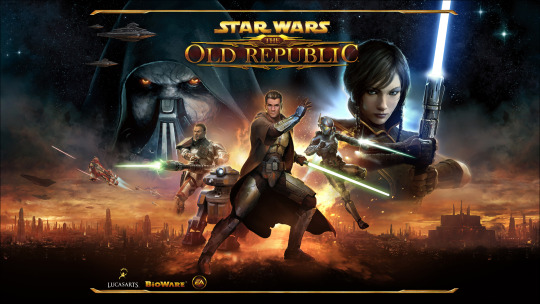
But since I'm here with my worldbuilding hat on, I'm going to ramble about Star Wars: The Old Republic, focusing on some of the sometimes-hilarious drama that's implied by the plot, and the implications for how these shenanigans remade a major galactic society in the process. Involved will be a man who faked his death to get out of going to meetings, a wine uncle who might become emperor, a living scowl with dangerous shoulders, and other assorted animals.
Expect a lot of bonus rambles in the image alt-texts, which is where I store commentary and jokes that I can't fit into the flow of the main post.
———
Before I dig into the topic at hand, I have to set the scene for those who don't know the game, or have forgotten in the fourteen years since the game launched.
Spoilers in the post below for Act 1-3 of the Imperial Agent, Sith Warrior, and Inquisitor storylines, Act 1 of the Jedi Knight storyline, the post-Act 3 Battle of Ilum flashpoint, and for various expansions including Rise of the Emperor, Knights of the Fallen Empire, Onslaught, and Legacy of the Sith. Assume that all reference links to Wookieepedia contain major spoilers.
SWTOR is an MMO set 3600 years before the Skywalkers crashed through the ceiling tiles of the galaxy, though it's not to say anything was less chaotic back then, just different chaos.

(Pictured: Anakin Skywalker, circa 32 BBY-4 ABY)
In this time, the titular Old Republic is opposed by a Sith Empire, which is precisely as functional as one might expect. After a decades-long conflict that ended with a Sith victory but left both sides exhausted, a state of cold war began. The Jedi, their Grand Temple destroyed, left Republic space to settle on an ancestral world. The Republic, battered and reeling, tried to recover its stride through use of its superior size and resources, and producing a truly unhinged number of superweapons.

The Sith Empire, in some ways, tried to pretend everything was fine for quite a while. They had successfully forced the Republic into a favorable treaty to end the war. They'd gained territory, they had a lot of work to do there.
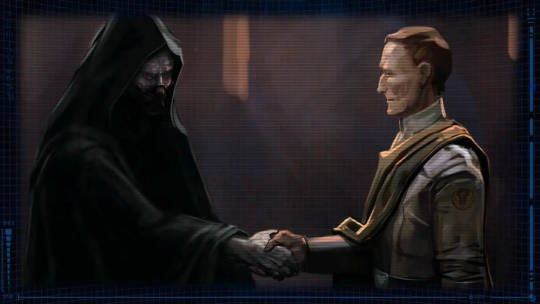
…But as things started to look more and more like war again, they were left with the uncomfortable realization that they had sorta kinda killed most of the Sith in the last war, and Imperial citizens in good standing weren't producing enough Force-sensitive kids fast enough to rebuild the losses. Might've had something to do with most of them being dead.

The Empire, of course, is an absolute clusterfuck of a society. Slaves toil to maintain its power. Children of a slave and a citizen will be citizens themselves—unless they're "aliens", a category that includes everyone that isn't a human or a Sith pureblood, the original Sith species.
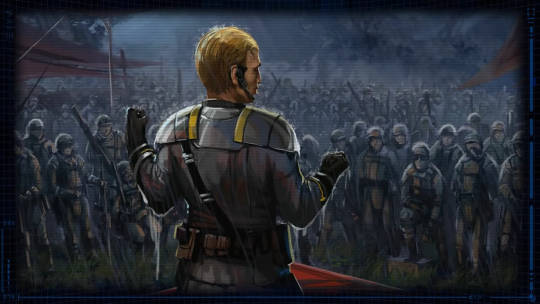
Being a citizen isn't great either: The Force-blind face mandatory conscription into the military, and can never rise to the highest echelons of society. Above them, the Sith act as a semi-hereditary aristocracy of evil space-wizards that serve an immortal, eldritch Emperor, their living god who has also kiiiind of gone AWOL for reasons only a few of them understand. He's torn between doing his job or staring at a living paperweight, and the paperweight has been winning. He also recently got trapped by an evil hole in the ground, it's complicated.

With the Emperor incommunicado, the duties of the state fall to the Dark Council, a ruling body of up to twelve Dark Lords of the Sith. Each have their own sphere of governmental influence, which are, one can only assume, very dark as well.
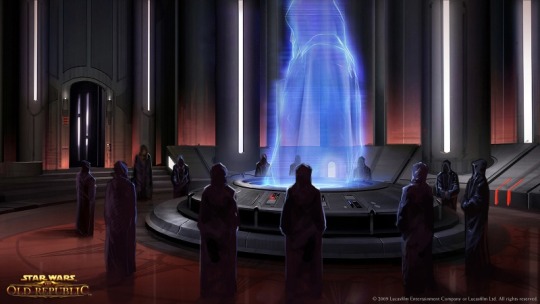
Presumably, the Dark Council had something to do with the inevitable yet still surprising solution to their space wizard deficit: over a thousand years of laws were suddenly overturned. Slaves, aliens, and prisoners were not only permitted to become Sith, it was now mandatory that they report for induction into training programs if they possessed any hint of Force-sensitivity.
This is how one of the eight protagonists of the MMO gets their start: if you play the Sith Inquisitor plotline, you begin as a former slave who has survived basic training and made it to the Sith Academy, where your teacher dearly wants to kill you. Your first mission: survive school.
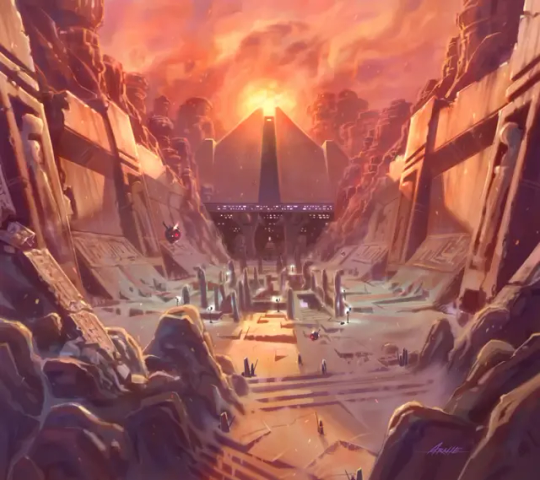
I'm sure this is very relatable to quite a lot of you.
Now that I've got my PhD with only a few gray hairs, I'm looking back at this premise and thinking: This would completely upend the social framework of the Empire. You'd have every established Sith Lord in the Empire scrambling to kill these threats to their power, or harness them against their enemies, or both.
This is actually canon, but canon never touches on the broader, systemic implications of what the new Sith would do, and who they were before—Sure, the overseers of the training programs seem to be doing their damnedest to kill and undermine the newbies while maintaining plausible deniability, but enough of them survive to reshape the Empire. We know that. You play as one of them.
How in the fuck did the Dark Council ever manage to get this policy implemented in the first place? Obviously they did somehow, but the specifics are never mentioned.
But the specifics have the possibility to be hilarious.
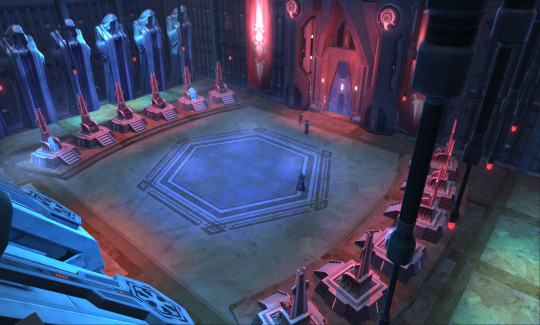
The Dark Council itself is composed of Sith who either killed their way to the top, or inherited their seat from their Sith master—who they probably murdered. Turnover on most Council seats is incredibly high. The Spheres of Ancient Knowledge, Technology, and Military Offense each have three different Councilors within a single year, for example.
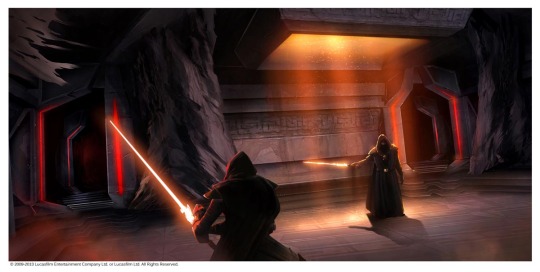
This also means that whoever ends up in charge of a Sphere might be entirely unsuited for it. Who heads up the Sphere of Expansion and Diplomacy? The least diplomatic guy on the Council, naturally. He goes by Darth Ravage, which fits in well enough with the three different Darths whose names mean 'death' (Thanaton, Mortis, and Rictus). The player can even end up as Darth Nox--'Darth Night'. You get the title by killing one of the Darth Deaths.
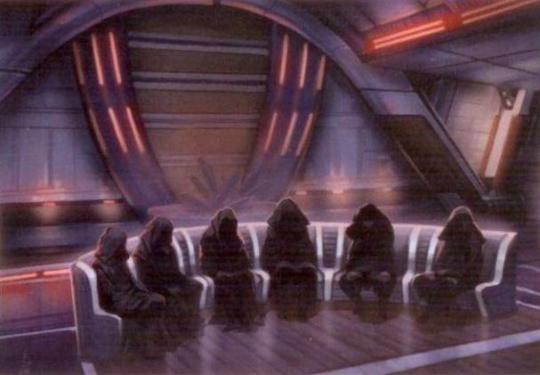
So, which of these barely-domesticated evil goths probably voted to allow 'inferior' beings to become Sith, overturning a fundamental tenet of imperial sith philosophy? Probably not the guy in charge of Sith Philosophy! We never see him, but he seems to have been a traditionalist. On the other hand, Darth "Murder has no rules" Ravage might not be huge on tradition, so we can mark him down as a "maybe". But he doesn't seem to be an instigator for something like this.
But on the subject of instigators: Darth Jadus.
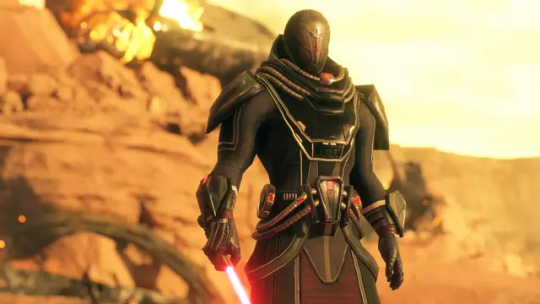
Darth Jadus is an experience. While many of the other Council members make it quite clear they're angry enough to chew on the furniture, Jadus unnerves all of them by being utterly calm and composed, as long as you don't count how intensely fervent and irrational he sounds when he starts talking about the Dark Side. He's unhinged in a distressingly hinged-seeming way.
Heading up the Sphere of Intelligence, Jadus is a noted iconoclast on the Dark Council, using his authority to open Imperial Intelligence positions to aliens. He chooses slaves and Force-blind citizens to be his advisors and agents, ignoring the traditional power structures of the Sith. He prefers his literal cult following of fanatical adherents instead, who see him as a visionary savior, a terrifying inevitability, or both.
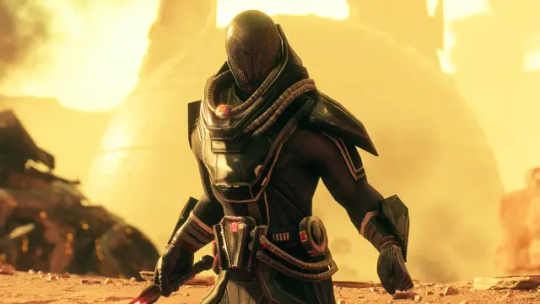
This means he seems to have basically no interest in elevating other Sith. In fact, he hates the way the rest of them run the Empire. Making more of them might potentially be against his interests.
Or at least it would be, if he didn't have some long-running secret plans that he wants to keep the other Dark Council members from catching wind of. Advocating for slaves, aliens and convicts to become Sith would superficially fall in line with his philosophy, and just raising the idea in public could cause such social chaos that his true plans would benefit from it. Jadus is also the most genre-savvy sith in the entire game: he seems to almost be aware at points that he's neither the protagonist nor main antagonist, and thus his evil plans involve not messing with either of them. When he jostles up against the main plot and realizes he has no plausible means to derail it, he responds by leaving the plot entirely.
Given the tactical chaos and uncomfortably fourth wall-touching strategies Jadus makes use of, let's mark him down as a "yes".
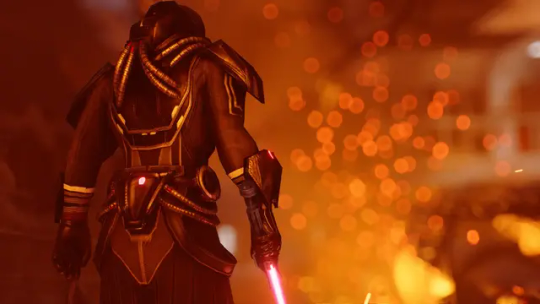
But Jadus is an unpopular one on the Council. He's creepy. Sith HATE feeling creeped out. That's supposed to happen to other people, dammit, not them! And with his disinterest in politics and his deep interest in foisting his manifesto on everyone, he's not the most effective Dark Councilor.
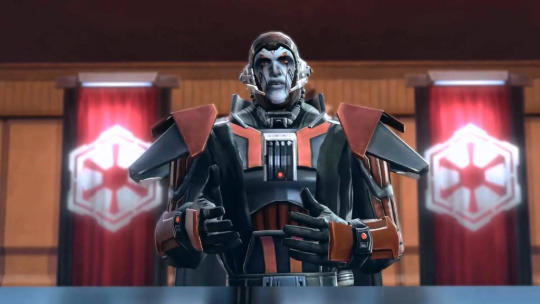
He might be able to pull in a few—Darth Decimus, head of Military Strategy, seems to have been quite willing to exploit any advantage he might be able to squeeze out of a situation. Fun side note, his voice actor also played the First Order officer who was just so done with Hux at the beginning of The Last Jedi.
youtube
[Video Description: A compilation of Mark Lewis Jones as Captain Moden Canady from The Last Jedi, with the video quality partially encrunchified by YouTube. This includes all of his shots from the film, from arrival of the Seige Dreadnought Fulminatrix, to the extremely annoyed look he gives the fireball that kills him. Sound supervisor Matt Wood was apparently pretty sure "FIRE ON THE BASE!" was going to be used as an EDM drop, and I can confirm, I've heard it out in the wild.]
Who else have we got rattling around in this Council, who might have extremely ridiculous reasons to vote yes? Well, we have Darth Vengean, head of Military Offense, was all about the Offense. Who needs defense? That nerd Darth Marr? HA! No, Vengean wanted to restart the war with the Republic. More bodies for the war machine would probably be fine with him.
Speaking of that nerd Darth Marr, Darth Marr.

Apparently he designed this armor himself. Solid effort, my man.
Marr is in his sixties by the time the game happens. He's one of the longest-surviving Dark Councilors, and he sounds so tired of his coworkers in every scene he's in. Heading up the Defense of the Empire, Marr also is the de facto leader of the Dark Council, by dint of being the only adult in the room.
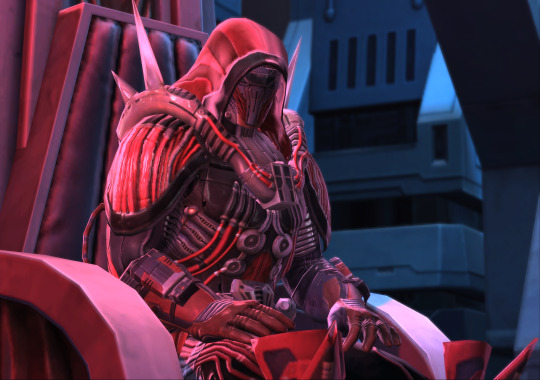
Much like Jadus, he distances himself from the backstabbery and rivalries among the Council members. Unlike Jadus, he 100% means it, and has been focused on not making the Empire explode. He eventually ends up as the unofficial leader of the Empire until he gets one-shotted so hard it makes his ghost chill out a bit. He keeps the spikes, though.

So, if there's anyone on the Council who might vote for this on purely practical grounds, and has the power to push others into agreeing with him, because so help him if they don't stop holding duels in the conference room he's going to turn this Empire around—
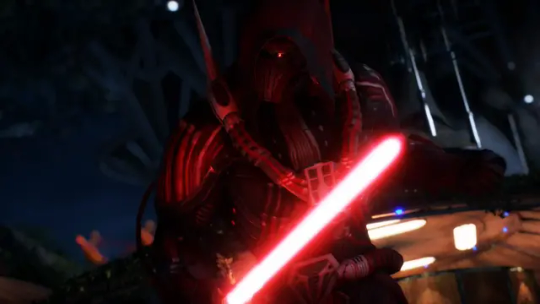
Nobody listens to him on that, by the way. Both the Sith main plots involve duels in the conference room.
In fact, one of those duels is egged on by our last suspect. Marr might be a contender for longest-running Dark Councilor, but there is another candidate: Darth Vowrawn, who seems to be having a much better time being on the Council than Marr. I suspect the only reason why he doesn't have a bucket of popcorn with him in the Council chambers is because somebody made a rule that he had to stop doing that.

Vowrawn is a surprisingly cheerful old bastard who seems to have turned his hobby into his job. He shows up 'fashionably late' to someone else's attempted coup, after lamenting he can't sell tickets to the clusterfuck that's about to commence. In the expansions to the game, he can outmaneuver and outlive all of the competition and end up becoming the Emperor, at the age of 87.
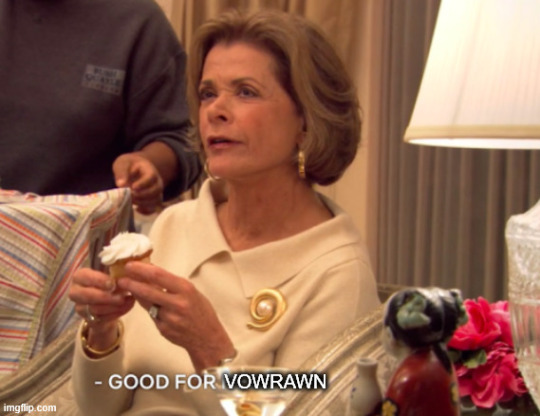
Vowrawn is also indifferent to against the Empire's policies--he supports the ascension of a Zabrak to the Dark Council, and takes one as an apprentice as well. Beyond that, Vowrawn would have to support this move, because he's instrumental in any large project like this, both politically and practically. While the others I've mentioned all have roles explicitly to do with the aggressive expansion or protection of the Empire, Vowrawn heads the Sphere of Production and Logistics. In essence, he's the one who can decide whether all these other bozos get to eat or not.
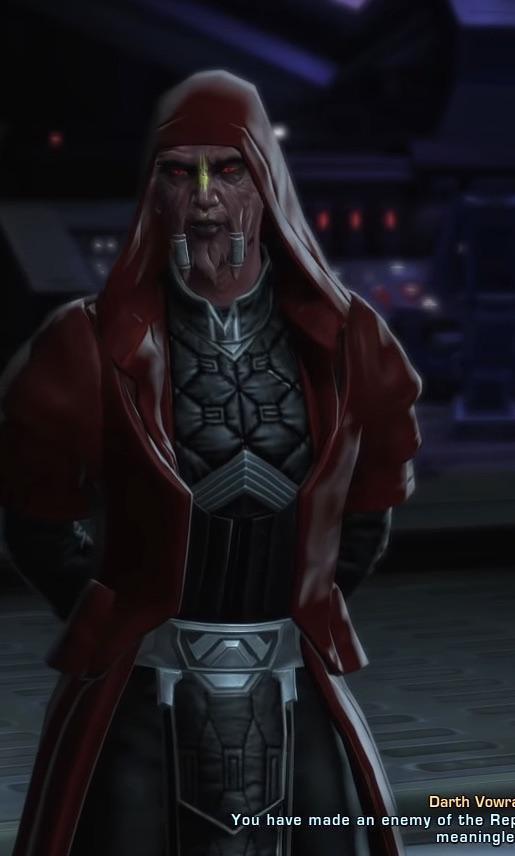
If Vowrawn didn't accept this change, then it would have failed. So, he's a definite "yes" by default.
Speaking of bastards who are still active well into their eighties, we have one last major figure who isn't on the Council that likely advocated for this: Darth Malgus.
youtube
[Video Description: The "Deceived" trailer, set ten years before the game. God, I love this thing. This was the first trailer I saw for the game, and it got me, it really did. The Sith are just as ridiculous as they should be, combined with choreography that feels a lot more crunchy than lightsaber combat had been before, with distinct combat styles for the two main fighters. It's quick, it's impactful, and it's got a memorable conclusion. Love it.]
Malgus is as anti-racist and anti-classist as Jadus is, but without the insane transcendental Dark Side philosophy. Instead, he has an insane philosophy of bettering the Empire through eternal war, which he believes everyone should have an equal ability to participate in. He is what would happen if a Warhammer 40k character had an inside voice.
youtube
[Video Description: The "Disorder" cinematic trailer, set before the Legacy of the Sith expansion. Malgus is 75 here. Man's held together by spite and screws and whatever nutrients you can absorb by being thrown through walls. He's fully given up on the Sith Order at this point and is trying to do his own thing, and he makes it look rad. The choreography has only gotten better, goddamn. Why did it take me three goddamn years to watch this. IT'S REALLY GOOD.]
Malgus is a big deal in the military, with a lot of support from both the Force-blind soldiers and earning the loyalty of a surprising cross-section of Sith. We know this, because he nearly hijacks the Empire at one point in the early expansions. He'd be into this idea, and he probably advocated for it. While he'd have the most direct interaction with the military-related Councilors we already have in the "yes" column, he also has a history of annoying the bejeezus out of other Sith on "his" turf, so who knows! He may have been more persuasive to the others we haven't dug into.
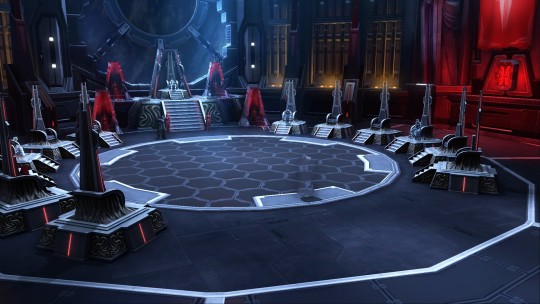
And we can't really dig into all of them at the depth we have with some. Despite how bogglingly huge SWTOR is and the two thousand four hundred and ninety-five named characters and "Additional Voices" credits in IMDb, we never meet some of the Dark Councilors. If you don't play all the eight main storylines, you won't see all of them in the game. I'll admit, I've never seen Darth Hadra, because I've never gotten that far in a Republic-aligned storyline! The Sith you encounter in their stories can often be more one-note, because they're purely there as antagonists rather than people you are legally required to hang out with, and thus have more opportunity to pester mercilessly.
[Video Description: A clip from my own Warrior run-through, featuring my big lad Rejalgar, his coolest friend Vette, and his boss, Darth Baras, who is presently having a screaming tantrum, which Rejalgar makes worse with the most delightfully straight-faced "Is there a problem here?". The Warrior plotline lets you play things sincerely evil, sincerely noble, or sincerely hilarious. Do you want to see Jedi bluescreen when a Sith just straight-up refuses to be violent? Do you want to sidestep a boss fight by offering a family a government pension, something your boss commends as being very devious and evil? Do you want to break up a fight between gangs by threatening to eat them? Come play the Sith Warrior storyline, and be the chaos you want to see in the galaxy!]
youtube
[Video Description, from a clip I uploaded to YT specifically for this post after I found out you can only upload one video per tumblr post wtf: A clip from my Inquisitor run-through, featuring my extremely shirtless lad, Sericus, playing coy and a little airheaded when called up by his Sith master, Darth Zash. Back in the day, Purebloods weren't supposed to be played as canon for this storyline, but there were tweaks later made to dialog that provided a canon explanation for how someone with visible Sith ancestry could end up in this situation. The storyline, however, unfortunately does not fully account for a character whose ideal job description is 'villain's beautiful and deceptively intelligent consort, the true power behind the throne'. It assumes you're playing a character who wants to go conquer and/or do mad wizard-science. Bonus points for eventually letting you marry your eight foot tall razor-faced cannibal thrall though, that's very fun.]
Why don't we see all of the Dark Council? Well, because they're ultimately not important to the story as a group. Events keep you locked tightly under the purview of just one or two of them on the Sith side of things, before the post-game and expansion plots launch you into the experience of being a major player in Imperial affairs, and Imperial affairs launch themselves at you in return.

Everyone realizes the Emperor wants to eat them. Then he dies, except he doesn't. Malgus takes over the Empire for a few weeks. Marr takes over, but half the Council is dead and the rest are still in orientation and are probably also dead, because their would-be successors assassinated them. The Emperor, only mildly inconvenienced by also being dead, eats a planet. Then things go completely off the deep end, and the Dark Council is no longer your concern at all.

It's economical storytelling to not belabor the rest of the Councilors, and playing through as an ex-slave Inquisitor, you continue to face enough challenges directly linked to your background that the resistance feels systemic, even if you don't actually see all that many others who are facing the same issues.
But I think there's a lot of potential for some really wild storytelling in there. Your character receives some level of basic training before they reach the Sith Academy, along with a whole batch of ex-slaves. What did that entail? How was it organized? What happens when folks from abolitionist movements start being trained as sith, gaining all the attendant legal authority over the life and death of others?
And what about the prisoners who were released for training? While one canon option is to play a character who was facing immediate execution for participation in violent anti-Imperial resistance, at least a fair chunk of Force-sensitive prisoners were probably serving longer sentences. What happens when prison gangs start gaining a foothold in the Sith Academy, where they're too dysfunctional to even form Mean Girl cliques? What happens when some of their members become full Sith? How many of them might have Hutt backing, or even funding from the Republic Secret Intelligence Service?
These are the sorts of things the Sith themselves are terrified of. This earns a very sarcastic thoughts and prayers to them, of course. Yet it truly is wild to think about the decision-making process that went into this massive societal shift that the game treats as simply a piece of inciting incident for two plotlines out of eight: Twelve unhinged people sat down in some extremely high-backed chairs one day and voted to give everyone equal access to lightning.

I love Star Wars, it's just the funniest shit imaginable sometimes.
#star wars#star wars: the old republic#swtor#swtor meta#darth jadus#darth marr#darth vowrawn#the sith empire is held together with only chewing gum and bad vibes#and it's hilarious#love these terrible idiots
339 notes
·
View notes
Text



pairing: Chishiya x fem! reader
warnings: basically no plot, this is just Chishiya straight up manipulating you <3
author note: this is definitely gonna need a part 2. I love him so much it’s unhealthy
The air in your room is heavier than usual.
You’re sitting on the edge of the bed, your leg bouncing slightly, as you seem a little lost in your thoughts.
It’s Chishiya’s smooth voice that brings you back to earth “You’re thinking too much”, his words make your eyebrows furrow.
You can’t believe how calm he is after betraying Arisu like that, and you have to stop yourself from scoffing.
“He trusted you” the words fall from your lips in a whisper, and Chishiya tilts his head
“That was his first mistake” when he speaks he has an almost amused look on his pretty face, it makes you even more annoyed.
Silence stretches between you two, and you can feel Chishiya’s gaze on you, he sees how conflicted you are, that you want to argue with him, and yet he perceives the slightest amount of doubt that starts creeping in.
He has the upmost talent at guiding people towards the conclusion he wants them to reach, and you are like putty in his hands.
With a slow, deliberate motion he sits beside you, close enough that you can almost feel his thigh touch yours, and it makes you stop bouncing your leg for some reason, his presence is almost suffocating in its calm, and his hand rests casually on the bed beside you, his fingers just barely brush against your own.
“You’re overthinking it” He murmurs, his voice low, almost coaxing, like he’s waiting for you to come to your senses “Arisu is stubborn, he’ll be fine” but as you look at the cards on the bed, all that’s etched in your mind is the look on Arisu’s face, shock, betrayal, hurt.
And all you can wonder about is how long will it take till you’ll be in his same position.
“What if he doesn’t?” The words slip from your mouth too fast for you to stop them, and you regret it, fearing that saying it aloud might actually manifest it
“He will” Chishiya says, with a finality that leaves no room for defiance.
You don’t answer, and his gaze on you is unnerving, but as your eyes wander around the room, you realize that he’s kind of right. You do tend to overthink things, let your anxiety gnaw at you as you think of the worst possible scenarios.
A soft sigh leaves your mouth, you genuinely don’t think someone has ever made you feel so uncertain about your intuition, but as the silence stretches on you do realize that he’s never been wrong, always three steps ahead of everyone.
Maybe you should trust him, let him guide you, show you what to think and feel.
“I guess you’re right” your voice overflows with petulance, almost like you don’t want to give him the satisfaction of hearing those words.
Chishiya doesn’t smile, but his eyes flicker with something like amusement, as if he already knew what you’d say before the words even left your mouth. His hand, still resting lightly beside yours, shifts just slightly, the tips of his fingers brushing against your skin in a way that feels deliberate, intentional.
“I always am” he says, his voice smooth, confident, like it’s the simplest thing in the world. It feels like he’s everywhere, filling the space inside and between you.
Your heart beats a little faster, and you curse yourself for even feeling this way. For feeling anything at all. It’s too easy for him, the way he reads you, the way his words settle over you like a heavy blanket, suffocating and strangely comforting.
“You’re not as strong as you think” Chishiya continues, his voice low, and your name feels so sweet said by him “None of us are. But we survive. And you’ll survive too. If you stop holding yourself back.”
When he shifts again, you can feel the heat of his body pressed against you, his thigh brushing against yours, almost as if he’s testing if you’ll pull away. You don’t.
“It’s easier this way. Let me handle the worrying for you.”
His words hang in the air, and the implied meaning is there, you just find it hard to catch it. You hate the way his voice dips lower, just enough to tease you, to send a shiver down your spine. And you swear that you try your best to focus, to ignore the heat building in your chest, but it’s getting harder with every passing second.
His hand moves slowly, his fingers brushing against the back of your hand again, but thankfully or unfortunately, you still don’t know yet, this time they linger. The contact feels calculated, like he’s trying to pull something out of you. His fingers slide along your skin with a subtle, almost teasing touch, sending a shock through your body. You don’t pull away.
“You think you’ve got me figured out, don’t you?” You say, though the words come out a lot more shakier than you intend. There’s a flicker of something dark in his eyes as he watches you, and the air feels even heavier.
“Of course I do,” Chishiya replies with a faint smirk. “I know exactly what you’re feeling. You’re just too stubborn to admit it.”
You glance at him, the smugness in his gaze makes you want to scoff, but something in the way his fingers brush across your palm makes you forget all about it. His touch is light, and yet it stirs so many unwanted emotions inside you.
“You have no idea what you’re talking about” you murmur, trying to regain some sort of control over the situation. But Chishiya isn’t one to let go so easily, you won’t win this game.
“Are you sure?” His tone is playful now, a challenge laced within it.
“I’m good at this” he says, his voice dropping even more lower, smoother. “I know exactly how to get what I want”
His hand finally settles on yours, his fingers intertwining with yours in a way that feels almost affectionate. He’s not letting go.
“I think you’re starting to enjoy this” Chishiya says, his voice soft but he’s clearly teasing you. “Enjoying the way I make you feel. Enjoying how I take the weight off your shoulders. Enjoying the way you’re not thinking for once.”
You open your mouth to rebut, but the words die in your throat when his thumb starts to gently stroke the back of your hand. The simple gesture feels intimate, almost too intimate. You try to suppress the involuntary shiver that runs through your body, but it’s impossible to ignore the blush coloring your cheeks
“Isn’t that so?” he whispers, leaning in so close that you can feel the warmth of his breath against your ear. “You want to be in control. You want to fight it. But deep down, you know you can’t. You want me to guide you, don’t you?”
You consider pulling your hand away, but his grip is firm, and for some reason, you don’t want him to let go. You might even want him closer.
“You’re good at this,” you admit, the words slipping out before you can stop them. “Too good.”
Chishiya’s smile deepens, a glint of satisfaction flickering in his eyes. “I know. And you love every second of it.”
There’s no denying it. The way his every touch, every word, pulls you in, it’s irresistible.
“Don’t worry” he murmurs, his lips brushing against your ear. “Let me take care of everything. Let me show you how easy it can be.”
You’re so close now. You can feel the pull, the heat, the undeniable tension building between you, and you’re no longer sure if you’re strong enough to resist it.
Maybe it’s time to let go.
#chishiya shuntaro#chishiya shuntaro x reader#nijiro murakami#alice in borderland#alice in borderland x reader#not proofread btw
147 notes
·
View notes
Text
Watcher
Cw: restraints, ellabs x reader, dom!ellie, porn with plot, switch!abby, sub!reader, abby tied up 🤭, nsfw, no use of y/n, hella teasy, use of pet names, no virus au, weed used, probably alot more :3
req from pookie!! (basically girlfriend!abby watching best friend!ellie fuck the brains out of you)
@joel-girl here you go !!!
It started with a late night facetime call between you and your girlfriend, abby, eventually inviting you best friend ellie to join. Ellie had given the idea of all three of you going to her house after you finished work the next day, and your plans were in order.
you busied yourself with making drinks at the counter, the evening rush suiting as a distraction for later. You noticed when abby walked into the coffee shop, smiling at you and leaning against the wall as your shift closed out.
taking off your apron, you pocketed your tips, clocking out and immediately kissing abby's cheek as she led you out to her car.
Texting ellie the two of you were on the way, you wore a smile.
"els told me she visited her dealer, got us something for if the movie got too boring"
"mm, so like every time you two hang out?" Abby smirked, her hands resting on your thigh as she drove.
"well.. yes, but it'll be fun if you decide to smoke with us" you smiled, looking up at your girlfriend with the eyes she always said yet too.
"..fine, love, only a little though. I still gotta get you hole safe" she said, squeezing your thigh as you now wore a wide smile.
"yay! You're the best baby" you smiled. Abby looked intimidating, but she was a total fucking softie.
the drive to ellies house only had a little conversation, most of it being you humming along to Abby's music.
watching your girlfriend pull into ellies driveway, you wore a smile, unbuckling your seatbelt and attempting to open your door before abby could do it for you, though she beat you and opened it with a smirk.
"Mm, what are you trying to do pretty girl? Maybe i'll have to cut the movie short and fuck you until you-" she was cut off by ellie exiting the house, now sporting a slight grimace.
ellie walked towards you both, smiling and side hugging you as abby pettily held onto you. You kissed her cheek, ellie laughing softly as your girlfriend glared down at her. Ellie and abby had been friends, and most of the anger between them was for shits and giggles.
following ellie inside, you glanced around her living room, a few rolled joints and a lighter on the coffee table and a guitar sat on the couch, a few movie disks arranged on the floor.
"so, what do you guys wanna watch?" She asked, moving the guitar back into its case before flopping down on the couch.
you looked up at abby, waiting for her answer as you grabbed a joint and lit it, deeply inhaling as you zoned out for her answer. She took the joint from your lips, inhaling before blowing the smoke in ellies face. Tonight would be long.

somehow it had escalated further than ever before. The three of you were always flirty, but it changed when ellie had cuffed your fucking girlfriend to a chair.
the effects of the weed had done so much to all of you, abby didnt even complain when ellie had grazed her hand all over you, simply watching with a smirk.
ellie had looked down at you, quietly whispering in your ear and asking if it was okay to continue what she was doing. She had already marked the fuck out of your neck, and made your lips beyond swollen. You desperately nodded, a needy whine escaping your lips as ellie crawled over you.
She turned you around, making sure abby could see you as she smirked down at you on the floor, tearing your underwear down to your ankles and sitting herself on your waist.
ellie looked up at abby with teasing eyes, making sure your girlfriend was watching when she ducker her head between your legs, holding eye contact as she licked your soaking pussy.
you held tight onto ellies hips, a whine escaping your lips as you felt your best friend's hot tongue on your heat. Abby was conflicted, not quite mad but hoping she would get a chance with both of you.
ellie laughed down at you, snickering as abby watched.
"Hm, love, wanna give your girl a little show? Make her watch while i make you cum?" She laughed, pissing abby off while making you grow even wetter. You let out a small, desperate whine, only pushing ellie further as she leaned back down.
her hands rested on your thighs, her eyes piercing into abby's as she licked across your clit, kissing you gently before taking the soft bud between her lips, looking down and focusing on you. She sucked hard at your clit, earning moans from you as she rubbed her tongue along your wet pussy.
digging her face further between your legs, she kissed your leaking hole, pushing her tongue in and out while placing kissed along your pussy. She glanced up at abby, smirking as she moved her lips from your pussy and pushed two fingers easily in, earning a deep moan from you.
abby let out a groan, pulling at the cuffs around her wrists as an attempt to fuck either you or ellie senseless. Ellie just laughed, digging her fingers deeper into you as you moaned against the floor, only making ellies smirk widen and abby try harder to be freed from her restraints.
ellie pushed a third finger into you, once again a sharp moan escaping your lips as she fucked in and out of you at an ungodly pace, your legs threatening to close around her hand. Abby watched as she fucked you, nearly escaping the cuffs as ellie leaned her head down against, sucking on your clit while still moving her fingers. Your moans were gurgled, biting down on your lip as your muscles clenched around her fingers.
all that did was make her go faster, fucking you so aggressively as your voice broke, your legs shutting around her face and hand as your built up tension broke, cumming against her as she just fucking laughed again. abby grew angry when you came, beyond pissed it was on another womans fingers. She managed to break the cuffs, immediately getting out of the chair, preparing herself for a long night.
#abby anderson#abby the last of us#abby x fem!reader#abby tlou#abby smut#abby x reader#tlou smut#abigail anderson#lesbian#the last of us#ellie willams x reader#ellie williams#ellabs x reader#best friend ellie williams#girlfriend abby#ellie x abby x reader#Top ellie williams
290 notes
·
View notes
Text
Let's talk about story structure.
Fabricating the narrative structure of your story can be difficult, and it can be helpful to use already known and well-established story structures as a sort of blueprint to guide you along the way. Before we delve into a few of the more popular ones, however, what exactly does this term entail?
Story structure refers to the framework or organization of a narrative. It is typically divided into key elements such as exposition, rising action, climax, falling action, and resolution, and serves as the skeleton upon which the plot, characters, and themes are built. It provides a roadmap of sorts for the progression of events and emotional arcs within a story.
Freytag's Pyramid:
Also known as a five-act structure, this is pretty much your standard story structure that you likely learned in English class at some point. It looks something like this:
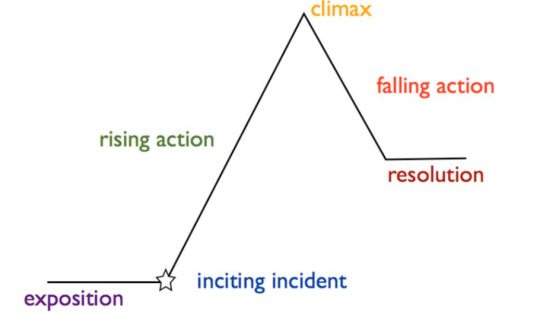
Exposition: Introduces the characters, setting, and basic situation of the story.
Inciting incident: The event that sets the main conflict of the story in motion, often disrupting the status quo for the protagonist.
Rising action: Series of events that build tension and escalate the conflict, leading toward the story's climax.
Climax: The highest point of tension or the turning point in the story, where the conflict reaches its peak and the outcome is decided.
Falling action: Events that occur as a result of the climax, leading towards the resolution and tying up loose ends.
Resolution (or denouement): The final outcome of the story, where the conflict is resolved, and any remaining questions or conflicts are addressed, providing closure for the audience.
Though the overuse of this story structure may be seen as a downside, it's used so much for a reason. Its intuitive structure provides a reliable framework for writers to build upon, ensuring clear progression and emotional resonance in their stories and drawing everything to a resolution that is satisfactory for the readers.
The Fichtean Curve:
The Fichtean Curve is characterised by a gradual rise in tension and conflict, leading to a climactic peak, followed by a swift resolution. It emphasises the building of suspense and intensity throughout the narrative, following a pattern of escalating crises leading to a climax representing the peak of the protagonist's struggle, then a swift resolution.
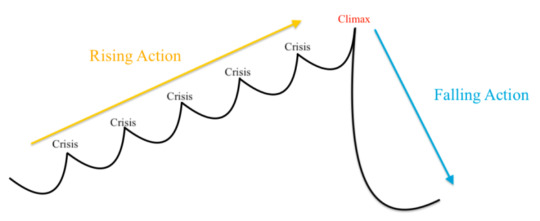
Initial crisis: The story begins with a significant event or problem that immediately grabs the audience's attention, setting the plot in motion.
Escalating crises: Additional challenges or complications arise, intensifying the protagonist's struggles and increasing the stakes.
Climax: The tension reaches its peak as the protagonist confronts the central obstacle or makes a crucial decision.
Falling action: Following the climax, conflicts are rapidly resolved, often with a sudden shift or revelation, bringing closure to the narrative. Note that all loose ends may not be tied by the end, and that's completely fine as long as it works in your story—leaving some room for speculation or suspense can be intriguing.
The Hero’s Journey:
The Hero's Journey follows a protagonist through a transformative adventure. It outlines their journey from ordinary life into the unknown, encountering challenges, allies, and adversaries along the way, ultimately leading to personal growth and a return to the familiar world with newfound wisdom or treasures.
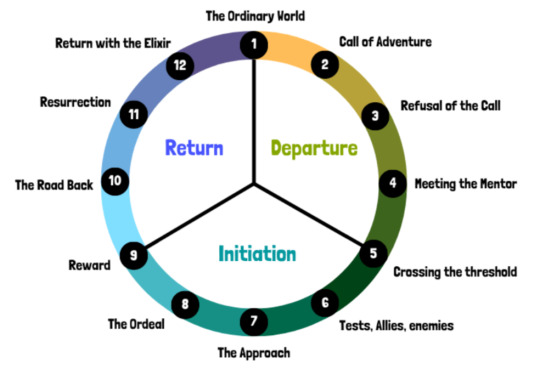
Call of adventure: The hero receives a summons or challenge that disrupts their ordinary life.
Refusal of the call: Initially, the hero may resist or hesitate in accepting the adventure.
Meeting the mentor: The hero encounters a wise mentor who provides guidance and assistance.
Crossing the threshold: The hero leaves their familiar world and enters the unknown, facing the challenges of the journey.
Tests, allies, enemies: Along the journey, the hero faces various obstacles and adversaries that test their skills and resolve.
The approach: The hero approaches the central conflict or their deepest fears.
The ordeal: The hero faces their greatest challenge, often confronting the main antagonist or undergoing a significant transformation.
Reward: After overcoming the ordeal, the hero receives a reward, such as treasure, knowledge, or inner growth.
The road back: The hero begins the journey back to their ordinary world, encountering final obstacles or confrontations.
Resurrection: The hero faces one final test or ordeal that solidifies their transformation.
Return with the elixir: The hero returns to the ordinary world, bringing back the lessons learned or treasures gained to benefit themselves or others.
Exploring these different story structures reveals the intricate paths characters traverse in their journeys. Each framework provides a blueprint for crafting engaging narratives that captivate audiences. Understanding these underlying structures can help gain an array of tools to create unforgettable tales that resonate with audiences of all kind.
Happy writing! Hope this was helpful ❤
Previous | Next
#writeblr#writing#writing tips#writing advice#writing help#writing resources#creative writing#story writing#storytelling#story structure#plot development#outlining#plot structure
518 notes
·
View notes
Text
The Sewer Squad's designs are fine, actually
If you ask me, the Sewer Squad from KHUX are a really great visual example of Kingdom Hearts' approach to writing and design.
That approach being: it's fine to make design and writing decisions that come across as silly, campy, unbelievable, or "cringey" if those choices are meaningful in context and contribute something significant to the story.

On the whole, the Sewer Squad are a mess of character designs. Minus the Leader who just kinda looks like a normal character tbh, the remaining 3/4ths of the group don't look particularly cohesive or even...aesthetically pleasing? At least for me. If you were to judge these designs purely on a visual and technical level, using commonly accepted character design guidelines, I personally don't think they would score very high.
Function has been thrown out the window with their accessories, with a lot of said accessories looking either bulky, heavy, face/movement obstructing, or just plain uncomfortable, despite them presumably fighting Heartless on the daily.
Color palettes are all over the place, especially with the Gummi Girl who's sporting three different hues of pink all conflicting in one design. Themeing is likewise all over the place—using the Gummi Girl once again as an example, she's pairing futuristic Gummi ship wings with a ninja outfit and a modern-looking frog hat. Which like, normally you can marry vastly different themes/time periods together into one character design just fine if you do it well, but here these elements are just kinda pasted all over the design separately with no blending/discussion between them. (Yes I know this makes perfect sense given the lore; I'm getting there.)
And then characters like Fancy Bowtie Boy are wearing gimmick-y clothing pieces based off of canon characters, such as Ansem SoD and...Halloween Town Goofy, for some reason. Which makes the design look derivative and nonsensical. (There's a way to justify this in canon thanks to the Book of Prophecies and the medals, but it's still kinda weird and offputting to see one of the Big Bad's gloves on a silly side character.)
It also doesn't help that their outfits/hair/facial features weren't designed specifically with them in mind, and instead are comprised of various disparate, pre-existing Player assets slapped together haphazardly. And not being able to give these characters more thoughtful, bespoke design elements means losing the opportuntiy to communicate who these characters are more precisely.
They do have recognizable silhouettes though (along with some much needed diversity), so I'll give them credit for that.
But, everything I just said and criticized above? THAT'S ENTIRELY THE POINT, BABY!!!
They're not supposed to represent a typical character with a typical character design that follows typical character design rules because they're not typical "characters"—rather, they're supposed to represent the average, real-life players playing KHUX. The people who buy random outfits with whatever Jewels they have and then mix and match the pieces together regardless of whether or not they actually look "good" together or logically connect. The people who are just having fun with customization.
And this distinction is meaningful because the whole idea behind these characters is that they belong to the same party that the Player belongs to. They're not like Player's other friends such as Ephemer and Skuld who are main characters in the plot and thus require more visually pleasing and thought-out character designs; they're not "generic" NPCs that Player runs into only once or twice like the "my friends aren't my power" guy who can just wear one of the basic default outfits and it'll serve its purpose just fine; they are, specifically, Player's fellow party members. And if the Player themself is wearing a silly costume too, well, they'll just fit right in with the Sewer Squad, won't they?
Thus, they're meant to mirror the visuals and dynamics of real KHUX parties comprised of real people, hopefully making it easier for the person playing the game to relate to them (if said person belongs to a party themself) and intuitively understand the role these characters play in Player's life. And despite how unrealistic their outfits are (considering most of them are running around fighting in outrageous, cumbersome costumes), I would argue that their closer resemblance to the actual playerbase gives them the potential to feel more real, paradoxically.
This also just demonstrates KHUX's commitment to its story and gameplay integration. It doesn't matter how "silly" a gameplay feature might look or feel in practice, it is going to be properly represented in the story regardless. Lux, Guilt, Power Bangles, Spirits, Shift Pride, player costumes, it doesn't matter, if it's a part of the gameplay, it's going in the story somewhere. The game takes a risk and trades a little bit of immersion/suspension of disbelief for pure gameplay and story synergy. Perhaps it doesn't work for everybody, but in general it works for me, and I respect it.
121 notes
·
View notes
Text

October Moon
summary: three hours prior, Simon had told Maddie he'd loved her. That she hadn't needed to say it back. And he'd been sure that'd been fine...until that strange, hedonist ghost connection you'd told him you'd shared with Wally had returned with a vengeance, effecting not just you and Wally, but everyone within its radius.
pairing: Wally Clark x fem!reader
warnings: smutty smut smut. sex pollen basically. mad spoilers. and obvious Canon divergence. very involved, very dense plot.
bon reading, frens
___________________________💀
OCTOBER MOON pt.10
"She's too young to understand," Nanna scolded, "It's ridiculous anyway, he's my husband. Family."
Ginny spoke next, vexed, and it was clearly an argument they'd had many times before. "You aren't connected to that piece of the Awen, Abigail. You don't have to uphold the same obligations as we do."
You sat quietly at the top of the stairs. Even at six-years-old, you understood you'd broken a cardinal rule. Not your family's. A bigger, more important one that affected a lot of people. You hadn't meant to. It'd been a mistake. It still confused you how not being rude had been a mistake, the lessons conflicting, but you swore to yourself you'd never do it again.
Glum, arms around your knees, you listened to Ginny snap at Nanna.
"If she invites him closer to our side of the veil, it could be havoc. It's mycelial. If you give one an inch, they all steal a mile."
Nanna scoffed. She sounded different. Unlike you'd ever heard her. Fiery and stubborn and rueful. "It isn't that serious, Virginia, for heaven's sake. It's John. He loves that girl; he wouldn't let anything happen to her. Or to us."
"Maybe not, but it doesn't matter!" Ginny's voice raised, tensed, "Stop talking about this as if you know anything about the mechanics. You don't. Divination isn't Sight. They are separate."
"Nothing is separate." Nanna hissed back.
You felt a presence behind you, but you didn't turn around. Instead, you buried your head in your knees and ignored him. Dead Grandpa John took a seat beside you. He didn't say anything, simply sat there with you as you listened to Nanna and Ginny fight. All because you'd thanked him for showing you where Aurora had hidden your favorite Barbie.
The argument escalated until a door slammed and a car engine started. Footsteps on the stairs. Dead Grandpa John made himself scarce, though not before patting your back.
Ginny appeared on the landing. She sighed heavily at the sight of you, all wet cheeks and red eyes, and opened her arms to you. You went, lower lip wobbling.
As she held you, she said, "There are some big rules you'll need to learn now, chicken." And it sounded so serious. "I'm sorry I yelled at you."
"It's okay," You murmured, "I'm sorry I talked to Grandpa."
It would be eleven years before you spoke to another ghost.
‗‗‗‗•‗‗‗‗
As soon as you stepped over the barrier's threshold, you felt it. Goosebumps erupted over your skin, heat flushed below the surface. The air tasted sweet, the stars above were brighter, everything seemed so much better than it had been seconds ago.
Xavier called out from the truck when you stopped walking to adjust to the suddenness of that euphoria-adjacent sensation.
"You okay, kiddo?"
You nodded, assured him with a sure smile despite how rapidly your heart was beating. He studied you for a moment, eyebrows knitted, but let it be as soon as he spotted Wally strutting down the path from the school to the bus stop.
As soon as Wally had his hands on you, Xavier pulled back into the road and drove off.
"What the hell is going on?" You asked, his touch like a brand searing into your blood, making your cheeks flush and your knees weak. You tried to ignore it for the sake of the mission.
Talk to Simon about what he'd seen in the woods.
Wally swallowed, Adam's apple bobbing, and when did that become a turn-on?
"Everyone's at the fence," He said, his voice cracking on the last word, as if he was having trouble maintaining composure. His eyes were blown dark, lips parted slightly as he stared down at you like a four-course meal.
Not now, you told yourself. You had a mystery to solve.
Wally led you around the school to the fence where Simon waited with Maddie and the ghosts. Everyone seemed as fidgety as you felt, no one quite looking at each other, all flushed and perhaps even a little dazed.
Simon stepped forward, pressed his thumb and forefinger into his eyes before he spoke, "Should a random ghost be able to touch me?"
That sobered you. Temporarily. "What ghost?"
"Can they?" Simon insisted.
"No, a random ghost shouldn't be able to touch you. The only reason you can touch Maddie and Wally is because you share a bond with me."
"Right." Simon said, "That's what I thought." He shifted his weight from one foot to the other, took a deep breath, and then revealed, "A random ghost knocked me on my ass when I was chasing—" He cut himself off abruptly, casting a sideways glance at Maddie with an expression of guilt.
"My mom..." Maddie finished for him.
Like everyone else, she looked like she was burning up, her flannel already tied around her waist. You examined the others. Charley was sitting on his jean jacket on the grass, his gaze fixed on a fifth-floor window. Rhonda was pacing, slow, but you could tell she was trying to work out some energy without being obvious.
Ajay's coveralls were bunched around his waist, his foot tapping a rapid rhythm on the ground as he chewed his lip.
What the hell was going on?
You shook your head and tried to regroup, asking Simon, "What did the ghost look like? You must know him."
"Or he knows you," Simon suggested, which, yeah, that was more than likely.
When Simon described a man in his early forties, bellbottoms and a neat mustache, you know immediately who it was.
"You saw Dead Grandpa John?" You gaped, already stepping forward to scale the fence—the gate a few meters away be damned—and start searching the woods.
Wally grabbed you around the waist, pinned you to his—hot, hard—body, and clamped his hands on your hips to hold you there.
"No, no way," Simon urged as he, too, made himself an obstacle and planted himself between you and the fence. "We have bigger things to worry about."
"Like my mom." Maddie murmured, huddling closer to Simon, her face crumpled in an expression of pure anguish.
"Or why we didn't feel warm and tingly when Janet crossed over," Charley added.
A sharp exhale, "What was that last part?" You needed to know.
"Dawn crossed over," Wally said, and, shit, his mouth was right by your ear, humid breath tickling the hairs on your neck. His fingers dug into your skin through your jeans.
You swallowed, forced yourself to focus. "Okay, one mystery at a time," you decided, "You chased Sandra into the woods?"
Simon nodded.
"And you saw my dead grandfather?"
Simon nodded again, "He said something about a spiderweb? I don't know." Then, exasperated, "I can't fucking think right now," as he scrubbed a hand over his face.
"I'm going inside," Rhonda announced, her features set, ready to argue, although she was already marching away.
"Wait!" Charley called after her, "What about—?"
"I don't care!" Rhonda answered from the door, "I can't do anything about outside ghosts or Maddie's psycho mom, anyway!" With that, she disappeared inside, the door snapping closed behind with finality.
Charley grimaced, giving everyone an apologetic look on Rhonda's behalf.
Having rallied himself, Simon was back on task, asking, "Did your Dead Grandpa John always talk in metaphors?"
It was your turn to dole out an apologetic look, "We aren't allowed to talk to ghosts, remember?"
Everyone stilled.
Ajay asked, "Even your own grandfather?"
"Yeah. Even my own grandfather," You sighed, "Not that I care anymore. I need to find him and ask him if the bitch who killed my brother stole his stuffed lion." You attempted to pull away from Wally, "So, if you'll excuse me, I'm going to find him."
"No, you're not," Simon insisted, "His Riddles Three shit can wait, we need to figure out what to do about Sandra."
You saw red. Hadn't he heard you!? Didn't he care that Amelia had been in your house, had touched your brother's things? Had Aiden trapped at that fucking farmhouse where he was stuck in a loop, begging for friendship and company and—
Wally pulled you closer, banded his other arm around you, and held you. You wanted to shove him, kick him, snarl, scratch, lash out. But the longer he held you, the more his embrace soothed the impulse. Releasing a choked whimper, your body went limp in his arms.
"He said he couldn't say anything, anyway," Simon said softly, his tone bordering on regretful.
You felt Wally make some kind of motion before he asked, "Just...give us a second?" of Simon and the others.
They must've agreed since, the next thing you knew, Wally had maneuvered you up the slight incline and around the corner of the school building for privacy. Alone, he lifted you into his arms, turned and slid down the wall so he was sat on the ground with you straddling his lap. He tucked your hair behind your ear and kissed your head, temple, cheek, lips.
"Do you always call him 'Dead Grandpa John'?" He grinned when he pulled back to look at you.
Your snort bled into a chuckle, "We actually do, yeah."
"So you guys know you're not talking about Alive Grandpa John who exists, right?"
You shook your head, gazing at Wally with a weak but there smile. "Not even."
Wally laughed, light and fond, and nodded, "I bet he loves that."
"Hey, we're not allowed to talk to him, but he's more than welcome to talk to us. He could've said something." You challenged.
Pressed against him like this, now calm, you felt ashamed of your earlier aggressiveness. You peeked up at him, took in his carefree smile and soulful eyes, his pink cheeks, wet lips... He smelled good. Spicy beneath his natural musk. His hands stroked up and down your back, every pass igniting tingles under the skin.
"What's that look for, pretty girl?" Wally asked as he hooked a finger under your chin and guided your face up, thumb smudging across your bottom lip and then lingering at the corner of your mouth.
"I'm sorry," You murmured, "I just... Seeing Aiden tonight. Knowing he's...he's still there, stuck in a loop and so far away from home. God, it would kill my mom if she found out. And Amelia being in my house?" You choked, swallowed, tucked your face into his neck, and curled your fingers in his shirt, "Wally, I'm scared."
"Me too, baby," Wally cradled the back of your head, "And you wonder why I don't want you running into the dark, creepy woods at night?" He huffed, "Amelia could be anywhere right now."
"She could be anyone."
"Exactly," Wally's voice dropped, low and serious as he said, "If anything happened to you and I couldn't get to you... Baby, I'd lose it, I'd—"
You could tell he was spiraling, too many bad thoughts crowding his mind. So you did what you hoped would relieve his anxiety. You took his face in your hands and kissed him.
Slow. Deep. Meaningful as he held you, his big hands on your thighs, a little whimper from his throat, his bent legs falling open so you were forced to push forward and press your hips against his. Your weight rested fully in his lap, and you felt a twitch in his sweatpants, right where you'd been aching for him since arriving earlier.
"Wally..." You said like a secret under your breath. "We should..."
Should. Do...what?
It descended by rapid degrees. That thick, viscous haze you remembered had distorted your mind the first time Wally had kissed you. The world around you and him dimmed, faded, pushed back into the margins as you pressed into the cradle of his pelvis. A gratified sigh, lips connecting and letting out, over and over, soft kisses that turned blazing as it continued.
"Just a little longer, baby," Wally grabbed your ass and guided you against him, kissed you with rising hunger, "I missed you." He rocked his hips into yours from below, the evidence of his arousal stiff and hardening further in his sweatpants. "I've got all this...this energy in me since Dawn crossed over," he whined before he devoured your lips in another deep kiss. "I can't—please baby, I need to get it out of me."
You knew why. An energy shed. When ghosts crossed over—or ascended, rather—they sheared everything that held them to the earth. Bodies and the space those occupied; consciousness as human beings understood it; all barriers surrendered for their spirit to return to the cosmic nebula they'd dawned from.
Dawn's ascension had occurred in what essentially amounted to a sardine can where her earthly energy couldn't spread farther than the boundaries of the school.
Being in such close proximity must have made that euphoric and peaceful release that much more potent. Wally needed an outlet. And, having entered that bubble, you were rapidly succumbing to the same need.
You were hardly aware of your body moving on his, rubbing yourself against him through your layers and his.
"Please, baby," He repeated, "I want you so bad." One hand clenched your thigh while the other curled into your hair and angled your head, held it still so he could kiss you with mounting passion, "Please, just let me feel you. I need to feel you."
You whimpered, moaned, humped forward, and watched his face contort in pleasure as you ground against him. He matched your movements in that slow, sedate tempo, the anticipation and need swelling between you, around you, inside you.
"Wally," You whimpered as you felt his hand move from your thigh to the front of your jeans, expert fingers deftly undoing the button and dragging the zipper down.
"Don't stop, baby," Wally groaned, both hands sneaking into the back of your jeans, beneath your panties, to grab your ass skin-to-skin, "Fuck, it feels good."
He licked into your mouth, ravenous, hot, all teeth and tongue as he consumed every sweet, eager noise you made. His cock was thick and completely hard, the friction maddening even through the thin denim of your jeans. Desire lit up and ignited inside you with every touch, kiss, sound he delivered.
When he pulled back, his eyes were lustblown and heavy, "I wanna taste you, baby." His nails lightly dragged up your ass cheeks to your hips.
You nodded. Maybe. You weren't sure, everything deliciously muzzy, but you could think enough that you knew you wanted this.
Wally smiled, a lopsided, cocky thing that sent hot shivers through your nervous system. "Get on your hands and knees for me, pretty girl." A command more than a request in a voice like gravel.
Without hesitation, you did as he asked. Slithered out of his lap to position yourself with your ass in the air, legs spread, hips swaying as you wordlessly beckoned him to you. A fucking cat in heat, you'd never felt this kind of languid, cottoncandy desire before.
Vaguely, you wondered if this was what it felt like to get high. Acutely sensitive and remarkably unaware of anything beyond your little pocket of flesh and bone.
Your wayward thoughts were steered to Wally when his fingers slipped under the waist of your jeans to drag them down below the swell of your ass. You heard him moan, felt him press his clothed cock between your cheeks, and hump once, twice, before he shifted.
"Oh fuck!" You cried out, probably definitely too loud, but it didn't matter, nothing mattered, because Wally's tongue was sweeping through your folds from behind before he fucked it into you. His big hands squeezed your ass, face pressed between your ass cheeks, and he groaned in blissful satisfaction as if you were the best thing he'd ever tasted.
"So fucking sweet, baby," He said, and, glancing at him over your shoulder, you saw him lick his lips, his chin already glistening.
He winked at you, smug grin on his face, and then sank down to repeat the action. One finger dipped inside your pussy just to slick it up before it found your clit and rubbed in a firm circle. Your breath stuttered, brain turned to pudding, and, holy fuck, if he stopped you'd kill him.
Wally ate you out like he was going for gold, silver, bronze; every place, every medal, with gusto. And just when you were about to see God, "Gonna fuck you so hard, baby," Wally came up for air, shoved his sweatpants down, and drove into you in one fluid motion. Hard. The slap of skin on skin bouncing off the wall and ricocheting into the night. "F u u u c k."
You fell forward onto your elbows, cheek in the grass, body rocking from every beastial thrust. The noises his cock punched out of you were unlike any you'd heard yourself make, and what the hell was that? You didn't know you were capable of that pitch, that high note; so desperate and needy and completely fucking shameless in your lust for Wally as he pounded into you over and over, blunt cockhead beating your g-spot like a drum.
"Oh God, W-Wally!" You choked, gasped, whimpered in that order, forcing yourself onto your hands and slamming back just as good as you he gave you. So close, so fucking close, just a little more, God, please— "Oh fuck, Wally, don't stop!"
Grabbing you by your throat, Wally drew you upright, his cock still buried deep, and pressed your back to his front. His teeth found your neck; nipped, sucked, licked, his thumb pushed between your lips for you to suck. He moaned like rapture, pace faster, more feverish, as his other hand gripped your hip hard enough to bruise.
He was swiftly losing control, you could feel it, his hips stuttering, but he didn't stop, "Gonna come for me, baby girl?" And, shit, oh, oh—two, three, four more hard, brutal thrusts, his fat cock beating the ecstasy into your bloodstream—you came with a force that left you reeling. Waves crashed, galaxies lived and died, and you nearly blacked out.
The instant you clenched around him, Wally roared, primal, from the depths of his chest, nails biting your hip painfully as he fucked his climax into you. His fingers twitched around your throat, his eyes rolled back in his head, and he panted a mantra of your name punctuated by long groans.
When he stilled, you and he collapsed forward into the grass. He caught himself before squishing you under his weight, his hand quickly adjusting from your throat to your stomach as he kept you against him and rolled to the side.
"Holy shit," He breathed, sweatpants still around his thighs, softening, wet cock cooling in the open air.
The feeling rose from your belly to your chest and then outward. It started with a giggle that grew into a laugh which Wally matched with his own. You flopped onto your back, turned your head to stare at him as you and he came down from the high.
"Energy sheds are fucking. awesome." You decided with a wide grin, taking a moment to tug your panties and jeans back into place.
"Is that what that was?" Wally asked as he, too, put himself to rights. He sat up first, gathered you into his arms, between his legs, and sat back against the wall. "An energy shed?"
You nodded, snuggled into him, and stamped a kiss to his collar, "It's a side-effect of ascending. Or crossing over." You explained, "You don't take everything with you when you ascend, and what stays behind is dispersed. Usually, it has a lot more room, but I guess, with the Something-Something's barrier in place, Dawn's energy couldn't thin out." You grinned up at him as he blinked down at you in amazement.
"Jesus, it felt like I popped a dozen mollies..." Wally's head fell back against the wall, mouth slightly parted, brow glistening with a sheen of sweat. "Is it always like that?"
"It's not supposed to be that intense. Like I said, the shed's usually spread a lot thinner. People within a certain radius would feel a sense of peace and pure happiness. Concentrated like it is here? I guess it's a helluva drug." You speculated.
Wally swooped down to kiss you, affectionate and slow, and when he pulled back, "I'm still horny," he chuckled, "How long does it last?"
"I have no idea," You said honestly, a big smile on your face as you planned to spend the night with your devilishly sexy ghost boyfriend. That was until you remembered where you were and why you were there in the first place. Reality crashed over you like a bucket of ice water, "Oh my God, they probably heard everything!"
Wally shifted to peek around the corner, "Uh... I don't think they did." He said, "No one's there..."
"Yeah, probably because they heard. everything." You bemoaned into your hands, cheeks flushed for the worst reason.
"Babe, I'm sure it's fine," Wally kissed your temple, then your cheek, then your cheek again and again, an onslaught of playful kisses that tickled a giggle from you. "C'mon, sweet girl," Wally hoisted you easily to your feet as he rose from the ground, hugged you close before he led you toward the side entrance, "Let's go find the others."
‗‗‗‗•‗‗‗‗
Simon stared ahead, mortified.
Or, really, he should've felt mortified, but he couldn't bring himself to.
Maddie was breathing heavily, her cheeks a gorgeous cherry red, eyes glazed, lips kiss-swollen. Her jeans and underwear still dangled off a leg hung over the teacher's desk. Simon's jeans, however, were securely on though open, his come streaked on the yellowed linoleum he'd knelt on while he'd eaten Maddie out.
Whatever the fuck that interlude of lustfucknow had been, it'd passed, and in the aftermath Simon wasn't sure what to do or say or think.
Eventually, "Wow," Maddie exhaled, tipping back to lay across the desk. "Simon..."
Simon grit his teeth, winced, eyes squeezed shut as he mentally prepared for Maddie to freak out and tell him never to talk to her again. "Yeah...?"
Instead, "When did you learn how to do that?" she surprised him.
Simon blushed crimson and whipped his head toward her. He was on the ground, back against the wall, tucked beneath the blackboard with his knees up, hand over opposite wrist. He studied her expression as she finally maneuvered off the desk on wobbly legs and began to dress herself.
"It's not like I had practice," He confessed, unsure if sharing was caring in this situation. He did anyway, "I just...listened."
To her sounds; the whimpers and sighs and perfect, songbird moans of ecstasy he'd seduced from her with his fingers and mouth. Fuck, that'd been everything Simon had ever wanted. He'd yearned for the chance to give Maddie that kind of pleasure for longer than he would admit. Only, now that he'd had it, he wasn't sure how to process it.
Once dressed, Maddie plopped down beside him, rested her head on his shoulder, and looped her arms through one of his as she spoke, "You are a very good listener."
He couldn't help it, Simon snorted and hung his head, smiled in relief, "Thanks, that means a lot." After a few moments of oddly comfortable silence, he asked, "Do we know what that was?" Too afraid to question whether or not there was a chance it would happen again.
"I bet she knows." Maddie said as she glanced up at Simon, "We should probably go find her and Wally."
Her head was still on his shoulder, the way she'd rested it angled her face exactly right for Simon to gently lean down and press his lips to hers. Soft. Hesitant. And then firmer, harder, his body turning, one arm snaking around Maddie's shoulders while the hand of the other cupped her jaw.
"We should really go..." She whispered, but she didn't move.
Simon agreed, "Yeah," and didn't release her, both coming together again in a slow, deep kiss.
A sharp knock on the door pulled them apart, Wally's voice calling through, "You guys have pants on or should we come back later?"
They heard you yelp and demand, "What do you mean do they have pants on!?" And then, clearly not having seen who Wally saw, "WHO doesn't have pants on!?"
Before Wally answered for them, Simon called back, "We're coming!" to which he heard Wally snicker and gloat, I bet you are.
Simon glowered at the door.
Maddie laughed, fuller and freer than he'd heard since she'd been kicked into the metaphysical world.
It was surreal. Incredible. A little terrifying.
Maddie stood first and held a hand out to him, yanking him to his feet when he took it. He did up his fly and smoothed his hair back before taking her hand. They stood, staring at each other, Maddie openly admiring Simon in a way that made his heart race and his skin prickle. Wow. He felt complete, whole, at the peak of happiness, and he never wanted it to end.
Hand in hand, he walked her to the classroom door. Simon was both giddy and grateful that she didn't tug away or demand he let go of her even after he opened the door and stepped into the hall to meet you and Wally—equally as disheveled, he noted. Grass stains on the knees of your jeans and his sweatpants; your hair sex-mussed and his smile far too satisfied to be from anything else.
Simon glanced back at Maddie who adjusted their position, led his hand to her waist, and curled into his side. Like a lover. She looked beautiful and pleasured and a little sugarglazed after three orgasms, and Simon couldn't help himself. He preened.
And then got down to business.
"Talk." Simon said, giving you a significant look.
Your response, "We're high on ascension," explained nothing, yet Simon understood. Because Maddie had told him about Dawn and had managed to explain enough about what she'd been experiencing right before Simon had picked her up and pinned her to the desk.
Everyone was floating on some sort of post-Dawn's-crossing-over buzz as if they'd collectively inhaled an aphrodisiac. Neat.
When he took stock of himself, he realized he still felt it. That liquid hot desire coursing through him, less intense but there. He could read the signs of that intoxication all over you and Wally. He'd seen it on Charley's face before Charley had muttered something about the Art room. And Ajay, who'd loped off to the theater.
Jesus, they'd been drugged.
"Are we gonna regret this later?" Simon had to ask, worrying his bottom lip, unable to peel his eyes from the floor.
You must've picked up on what he couldn't say since, addressing Maddie, you said, "It's not like drinking too much. I'd say it's more like an anti-depressant. The good feelings that are already inside you have space to grow and you can't ignore them." You continued to explain what ascension actually was and then added, "I mean, you don't feel like fucking me, do you?" Also directed to Maddie.
The silence that followed made Simon's head whip up and his jaw drop. Thankfully, Maddie seemed to simply be considering the question and doing an internal scan, because she eventually shook her head.
"As cute as I think you are, I'm not coded like that."
"Same, babes," followed by, "Whether or not you guys regret it will have to be a conversation you have," you shrugged as Wally crowded closer to you, clearly not having appreciated the idea of sharing you if Maddie had said yes.
If you'd even go for it, of course. Which planted quite the image in Simon's mind and, oh God, when would this stuff work itself out of his system, please and thank you?
"Where are the others?" You wondered, dragging Simon back down to earth.
He cleared his throat, blinking and shaking his head to drive away the cotton slog that kept creeping in. "Charley went to the Art room, Rhonda...who knows, and Ajay said something about the theater."
Everyone sobered when Simon mentioned Ajay; downcast eyes and tight expressions of regret. Mina's absence meant Ajay didn't have someone to share that pure, radiant delirium with. Or maybe he'd found her, Mina drawn out of hiding by lust.
"We should split up and find the others. We need to figure out what our next moves are."
"No offense," Simon began, casting Maddie a bashful look, "But I don't think I have it in me to come up with next moves right now. I'm still...kind of..."
"Horny?" Wally supplied, grinning like a goof.
Simon didn't say anything, but he didn't have to.
Your determination was admirable. "Alright, what if we split up, and Maddie and I go together?"
Together, "No!" Simon and Wally rejected the idea immediately.
You rolled your eyes, "Guys, my brother is trapped in an abandoned house, Maddie's mom might be responsible for why she's a ghost, Amelia knows where I live, fuck knows where Dave is and what he knows, and if I'm not back at Xavier's before midnight, Sheriff Baxter is going to raid every building in Split River. We need to focus."
"She says like she isn't fondling her dead boyfriend," Simon commented, brow raised and eyes fixed on where your hand was on Wally's ass.
"Oh, shut up, I can still prioritize." You defended, glowering at Simon even as your cheeks pinked adorably.
"She's right," Maddie said and gave Simon a pleading look that he couldn't argue with if he wanted to. "I need to find out what happened to me. And if..." She swallowed, "and if my mom is the one who hurt me. She was here that day. I don't remember everything, but she was drunk and we argued. It was really bad..." Trailing off, Maddie stared at her boots, body trembling slightly under Simon's hand.
He brought her closer, kissed her hair and wrapped his arms around her to encase her in a comforting embrace. "Alright, let's go get the others and come up with what we wanna do next." He deferred to you for first steps.
"You said Charley's in the Art room? You guys go get him. Wally and I will find Ajay, and then Rhonda. We'll meet back at the fence. Good?"
"Good." Wally, Maddie, and Simon echoed.
You beamed, "Good. And no delays!"
Simon studied you for a moment, mouth twisting into an amused smirk, "You're still fondling your dead boyfriend."
You repeated his words in a mocking cadence and simply dragged Wally down the hall, leaving Maddie and Simon to laugh at your and Wally's backs.
‗‗‗‗•‗‗‗‗
Wally was riding high on ascension, whistling a tune he hadn't heard in years (Everybody Wants to Rule the World, and he didn't care what Charley said, it was a hit), literally skipping and jiving down the hallway toward the library.
He serenaded you with the lyrics as he pulled you into a loose and silly Two Step; twirled you, lifted you, kissed you breathless because he couldn't imagine doing anything else ever again.
When you and he reached the book return bins, Dawn's former piece of the metaphysical school, the flicker of a flashlight caught Wally's attention.
Instantly, he scooped you up and placed you on top of the bins, made sure you were safe and hidden before he approached the mouth of the hallway. On that same wave of whimsy, Wally finger snapped like a Greaser in a musical toward Security Guard Al, belting the chorus right into the man's face as Al halted his trek around the corner.
Al stood for a moment, staring directly through Wally to the other end of the hall, and then, repelled by Wally's ghostly energy, went right on his way. Back toward the office where he'd fish another donut out of the box the secretary had left him and watch the second half of the movie he'd been playing before his start-of-shift rounds.
Wally grinned, pleased as punch, and returned to you, arms outstretched to pluck you from the top of the bins. He didn't put you down, though.
Rather, he had you wrap your legs around his waist so he could spin you around and then press you against the wall. You laughed, partly at his antics, but mostly from the tingly remnants of Dawn's undiluted ascension. You slipped out of Wally's hold, feet on the ground, back against the wall, and gazed up at him.
In return, Wally towered over you, one arm propped on the wall above your head, opposite hand lifting to trail his fingers down the slope of your jaw, thumbprint grazing your lips. God, he loved you so much he was crazed from it. He had to tell you. A million times would never express it enough, but he wanted you to hear it, feel it, feel him.
"I love you, baby." Wally murmured as he leaned in and brushed his lips across yours. A barely-there tease that he let linger for a moment before he pressed in, hard and wanting. He hoisted you into his arms again, one hand on the curve of your ass, his hardening cock humping against your pussy through your jeans and his sweatpants. "Fuck, baby, I can't—this stuff is insane," He groaned after he nipped your earlobe. "I need you again, baby, please. I can't think."
"Yeah," You breathed, grinding back against him, "Yeah, okay. We can be quick, right?"
Wrong.
But Wally didn't want to say anything that would deter you from being carried to the boy's locker room—just down the nearby stairs and to the right—and fucked against the tiles under a warm shower. It was a fantasy Wally suddenly had to play out. He'd die all over again if he didn't. And you didn't want him to die again, did you?
"Do you, baby?"
You laughed, "No, Wally, I don't want you to die again."
He grinned into the skin of your neck, sucking a bruise over your pulse point, "Good girl."
Wally needed you naked and soapy and on his cock five minutes ago.
The journey to the locker room was interrupted by various breaks to pin you to walls and ravish you with kisses and desperate touches, Wally's hands groping everywhere he could reach. When he finally got you into the locker room, his cock was throbbing, a stain of precum blossoming through the fabric of his sweatpants.
You and he stripped in a frenzy, playful and carefree. You threw your jeans at his head, he grabbed you around the waist when you tried to dodge him, both you and he laughing like there wasn't a death cult possibly kidnapping teenage girls.
Wally manhandled you into the showers, your knees hooked over his arms, his cock driving into you from below as he held you easily against the tiles. He could see it in you, that his strength turned you on.
"You like it when I have you like this, baby?" He whispered darkly in your ear, one, two, three powerful thrusts before you answered with a beautiful keen and your pussy gripped his cock tighter. "Fuck, that's it baby. You take me so good, don't you?"
"Y-yes," You mewled, a sound that went straight to Wally's cock. "God, Wally, harder, please, I need it harder..."
And, Jesus Christ, that made whatever remained of his control snap. He granted your wish, hips snapping in sharper strokes as he brought you down on his cock harder. He could do this all night. All day. Forever. He wanted this forever. He wanted you forever.
Forever, fuck, please, let me have her forever, Wally begged whatever higher power would listen, fucking into you with abandon, a slave to his lust. You began to tremble into his arms, crying out on every hard upstroke until he felt you squeeze around him. And then, God, yes, and then his own release hit him like a fucking train.
After, he sunk to his knees, adjusted his arms so he could hold you properly. Wally panted into your throat as warm water streamed over you and him, steam clouding the air, the perfect cocoon to escape in and pretend the world didn't exist. Just for another minute. Just one...
However, it was several minutes (an hour) later when anyone showed up to the fence. Maddie and Simon were more disheveled. Rhonda was brazenly wearing Bernie's top and nothing else. Charley's neck was a Jackson Pollock of love bites. And Ajay was doing his best not to look anyone in the eye.
Everyone collectively ignored the heap of nude band students.
You and Wally were the last to arrive.
Oops.
‗‗‗‗•‗‗‗‗
In the woods just outside of town, Dave paced a trench in the loam, hands waving frantically as he ranted, "That manifesting little bitch!"
He looked awful. Unwashed. Unshaven. Bags under his eyes. His body was weak from hunger, and Amelia struggled to keep his mind quiet.
The plan was unraveling faster than she could keep up. All because of one. stupid. flaw: Had she known what that girl was, Amelia would've killed the day Amelia had assumed her father's body.
Placid, unmoved, leaned casually against the side of the Sheriff's cruiser, Sheriff Baxter watched Amelia carry Dave's body about, movements stiff and uncoordinated.
He allowed her to vent for a moment longer before, "I should've never allowed you to assume responsibility of the ritual." Dark and quiet and so sincere it made Amelia nervous. Raising his chin, the Sheriff leveled Amelia with a stern look, "You've fucked things up beyond repair, you dumb little girl."
That wasn't Amelia's fault. She'd been made the face of the Order decades ago, she'd earned the right to prove her leadership. To see things through in a way that abided with the new era that had been ushered in. Information and eyes everywhere. It was impossible to keep secrets nowadays and Amelia knew her plan would've been foolproof if it hadn't been for Madison Nears.
"It can still work," Amelia insisted, cowed, "I just need—"
"More time?" Sheriff Baxter scoffed, "You don't have it. Neither do I." He stepped into Amelia's space, voice menacing, "The ritual has been unchanged for centuries for a reason. A reason to turned your nose up to because of pride."
"It isn't pride, mother," Amelia spat, "It's survival. We can't risk another event like we used to. It's a different world. We'd be found out!"
The Sheriff huffed through his nose, eyes dangerous as he stared at Amelia, "We could've moved on. We didn't have to stay here." He paused to give Amelia a disgusted look, "I should've known you'd be too sentimental."
"This is the best place, you know this!" Amelia argued. "It could take longer than we'd ever have to find land as potent as this."
"We made it this way!" The Sheriff shouted as he stuck his arm out to grip Amelia around Dave's throat. His fingers dug into Dave's throat, strength inhumane and immovable.
Amelia whimpered, "I'm sorry, mother." She pawed at the Sheriff's hand, tried to suck in a breath, choked, begged with Dave's eyes to be released.
The Sheriff dropped his hand and took a step back, expression once again neutral.
"We don't have time for this, Amelia," He said. "Between the three other points, we have more than enough to perform the ritual. You need to find that vessel and return it before I decide to take yours and leave you in this life to rot."
Amelia made a kicked-out sound, "You wouldn't." But she knew Anabelle would. Anabelle wasn't prone to sentimentality or motherly love. She was ruthless. A trait that had seen her through to now.
There was a long silence wherein the Sheriff returned to lean against the cruiser. Pondering. Clearly angry.
At last, "You didn't tell me your little pet had stopped drinking the tea."
Amelia turned her face down and stared at the ground, her heart in her throat. No. She hadn't.
She stayed quiet. There was nothing to say for it.
"Sentimental." The Sheriff said like spitting acid, every syllable pronounced. "Look where that got you. Your student betrayed you. Your dog is losing control of his only charge." Eyes boring into Amelia's, "Get this under control, Amelia, or I take over, and I will not make room for mercy."
Amelia trembled in Dave's body, "Yes mother."
"Find your little bitch, Amelia." The Sheriff commanded, though, "I don't know how, given both your golems are now compromised." A bitter laugh, "How have I been so blind to your ignorance. Such a dull creature."
"I'm not stupid, mother," Amelia said with more force than she felt.
"I'll believe that when I see it."
The Sheriff shifted. Opened the driver's side door to the cruiser and slipped behind the wheel.
"Heed my warning, child. I can easily perform the ritual without you."
A boldfaced lie, but Amelia couldn't be sure her mother wouldn't find a way. Anabelle was powerful. Far older than Amelia. Far more practiced.
"And keep an eye on your pet. If she hasn't already woken up, it will only be a matter of time." Another significant look, "I think I'll bury you beside your late lover."
And that was all. The Sheriff started the engine and pulled out of the woods, onto the dirt road, leaving Amelia to suffer walking Dave's weakening body back to town.
💀___________________________
PART NINE - PART ELEVEN
also available on AO3!
MASTERLIST
#Milo Manheim#Wally Clark#Spencer Macphearson#Xavier Baxter#Nick Pugliese#Charley Morino#Wally Clark x Reader#fem!reader#Wally Clark smut#Wally Clark fanfiction#Milo Manheim fanfiction#School Spirits#zed necrodopolis#Disney Zombies#October Moon
103 notes
·
View notes
Note
Just as a curiosity lol, and if I may, but what's your view on other ships (I'm guessing you're fine with ships because you drew Paani x Dashi (which is very adorable btw, I love them sm ;w; . . . and your Dashi is gorgeous SOB)) ? Are there any other ships you enjoy and why, or just them? ^w^
Also, have a screenshot of them that I think is actually beautiful - the colors are so yummy, Dashi looks so happy, and Paani is so chill 🥺

Sorry if I'm rambling lol - I just think you're really cool and have a very beautiful artstyle and make wonderful octo-art 👉👈
NO UR GOOD!! I LIKE RAMBLY ASKS LIKE THIS!! and i love love dashi thank you for complimenting her design coz she's my life :]
i love that screenshot too, dashi is just so sweet and it looks like she's looking directly at paani while he spaces out
but here's some ships i enjoy :]
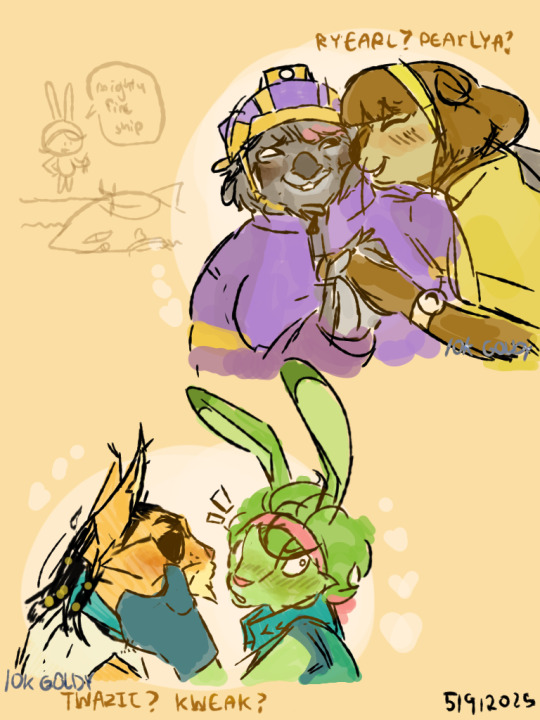
ryla and pearl came to my mind like a crane carrying a baby in a sack in its beak and i just think their personalities and vibes compliment each other greatly (sorry not sorry pearls husband)
twazii i began to like because i read like two fics on wattpad that had tweak and kwazii's relationship centered in the plot that had me clutching my temples. sometimes i still see their relationship like a friendship between two rowdy outcast students in different grade levels that made its way into adulthood
90% of the time i don't ship the octonauts crew with each other, it's usually them w/ an octoagent or octoagent and octoagent. but my views on ships change a whole lot depending on how I'm feeling so thats flexible. and it's also because I'm aroace and I'm conflicted with the way i ship characters. usually once I'm familiar with them i tend to prefer close platonic friendships over romantic relationships (although the line between the two is practically a gradient)
but i also still like dashi x paani i think they're really sweet,,,,
sooner or later ill give my opinion on specific ships like dashton and kwaso but again. really close friends :D
#octonauts#my art#octonauts fanart#artists on tumblr#octonauts above and beyond#octonauts pearl#octonauts ryla#octonauts kwazii#octonauts tweak#kwazii cat#tweak bunny#how do you tag ships#too tire to care
65 notes
·
View notes
Text
mira fake dates isa and/or sif is funny on its own (to me at least) but i've just decided that if it happens, it's not going to be because they won at communication or anything
instead. its going to be because someone gets pushy and makes some sort of comment to mira about one of them being her partner
and she panics and says yes.
and that has to be the starting point because 1) not only do i think mira would be unable to ask in a normal way 2) i think it's immensely funny 3) it's also somewhat funny if she tries to hide this fact from whoever she accidentally deemed her partner which also makes for a more multi-layered conflict/plot type thing
anyway. she should say its isabeau. then go to siffrin about it to seek help a la feelings buddies and then they both have to orchestrate this whole thing without letting isabeau find out.
like. isabeau would 100% be fine if he found out, but i think it's funny if mira "anxiety" belle and sif "(gestures generally at them)" frin fear that he won't.
see! multilayered plot. im so good at this.
#ramblings#phy-sat posting#isat mirabelle#isat siffrin#isat isabeau#isafrinbelle qpp#<- not explicitly but its on my mind while i write this. its always a qpp.#anyway i wouldnt say i /like/ thinking about fake dating but due to circumstances its been on my mind a lot lately#and sometimes art imitates life or something like that#mirabelle's fake dating disasters
78 notes
·
View notes